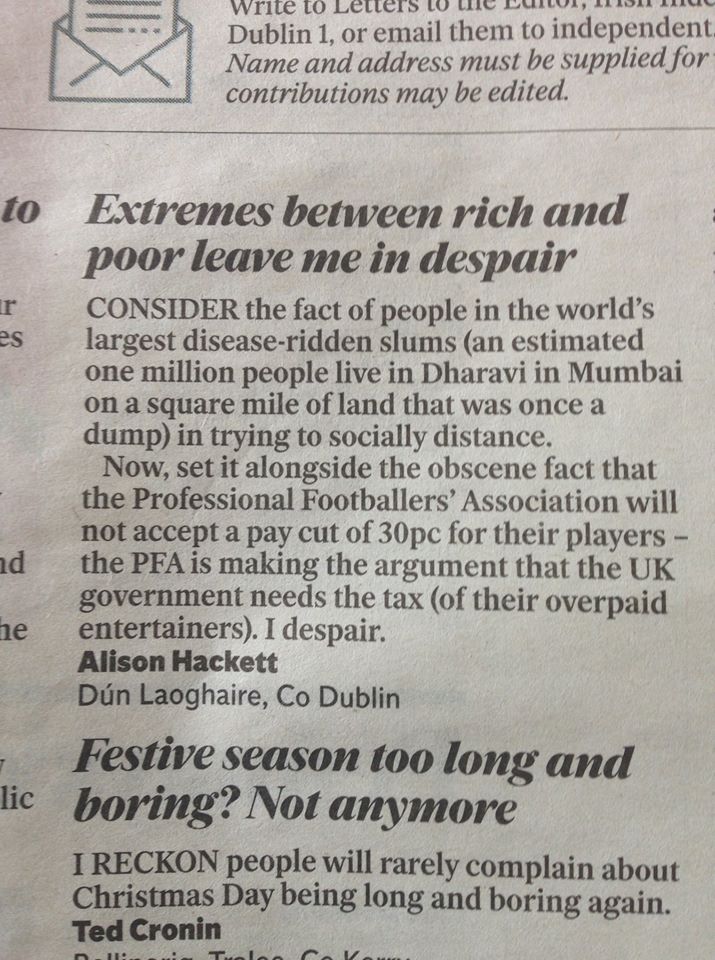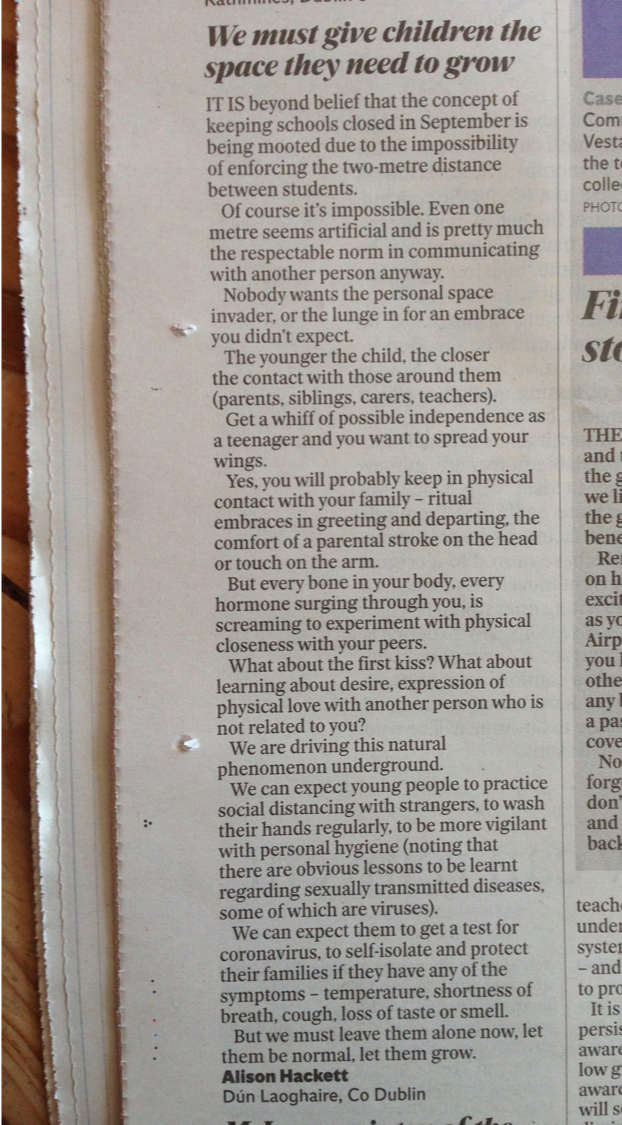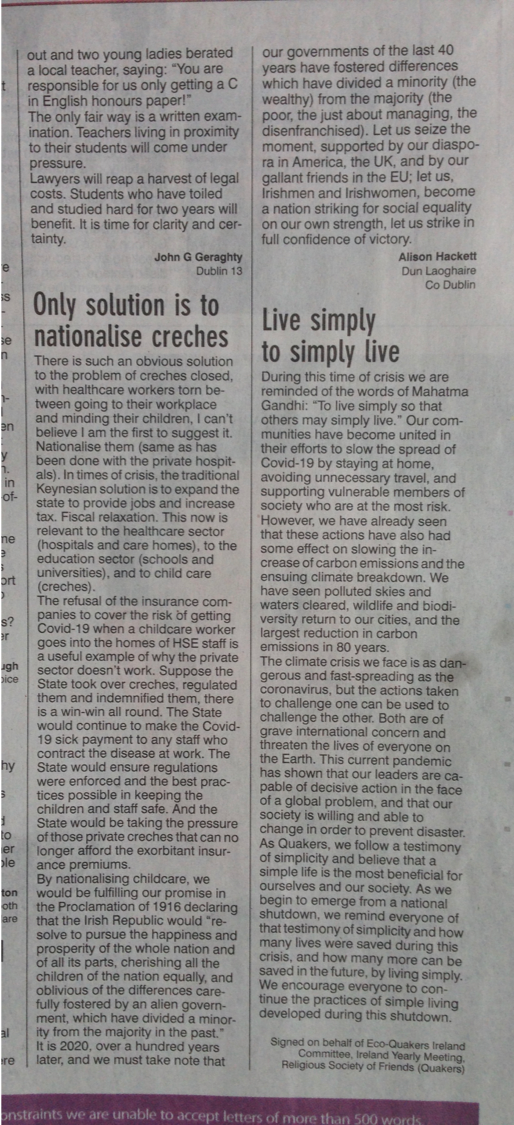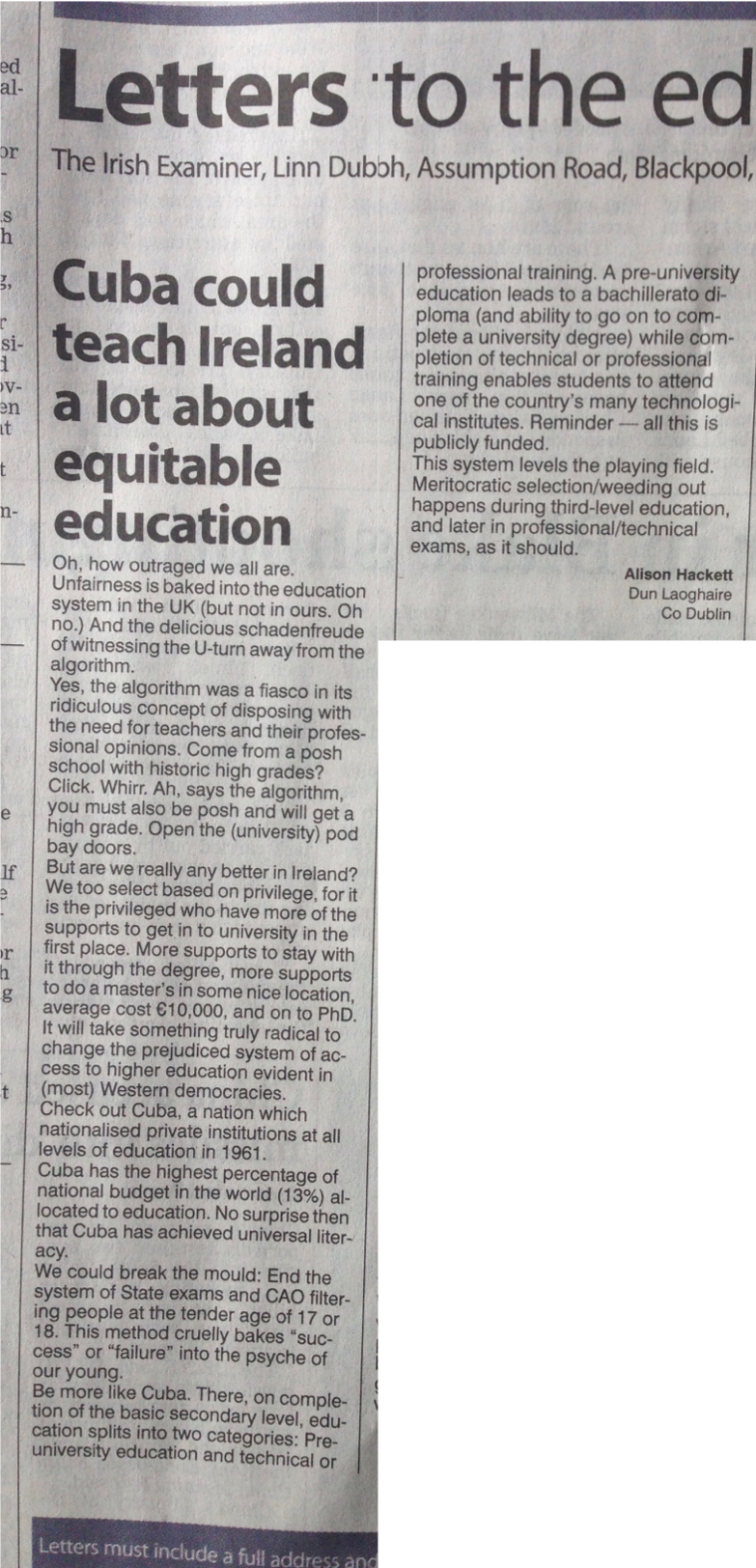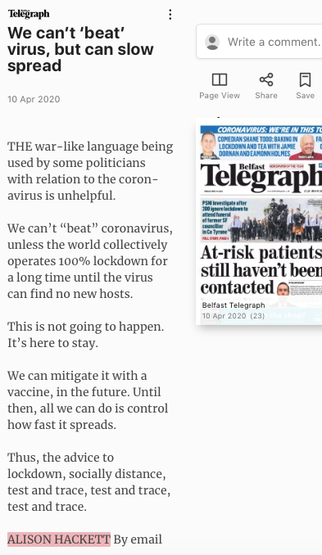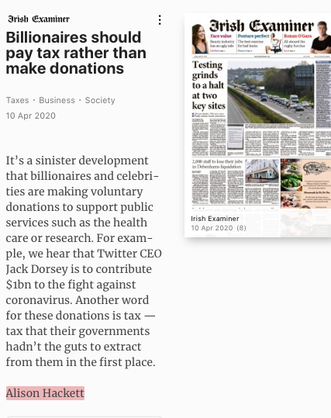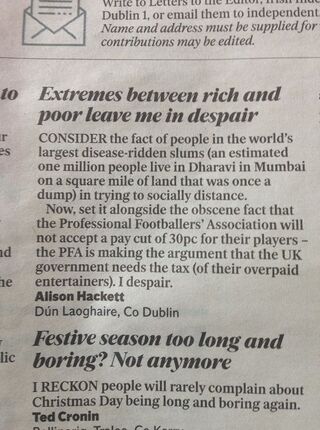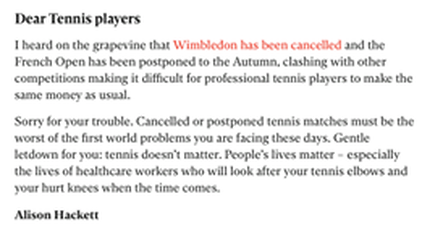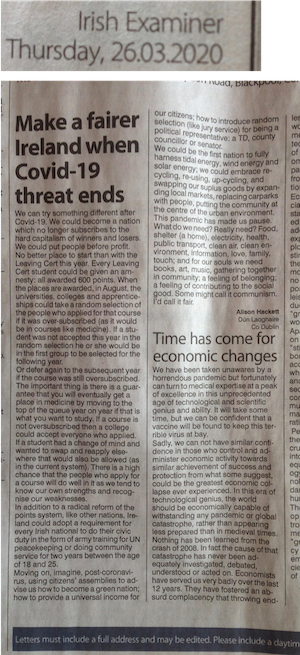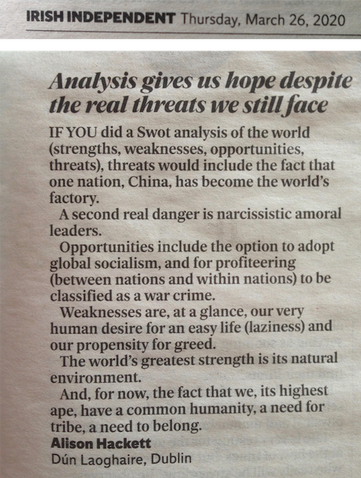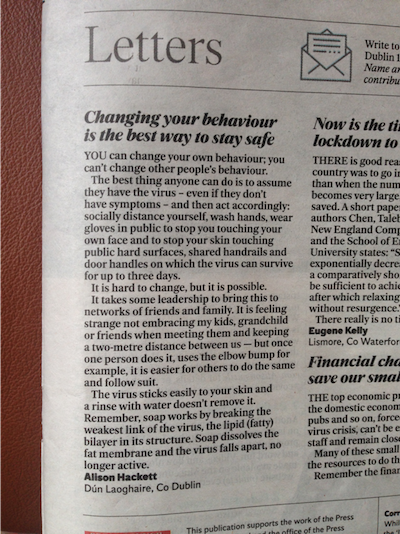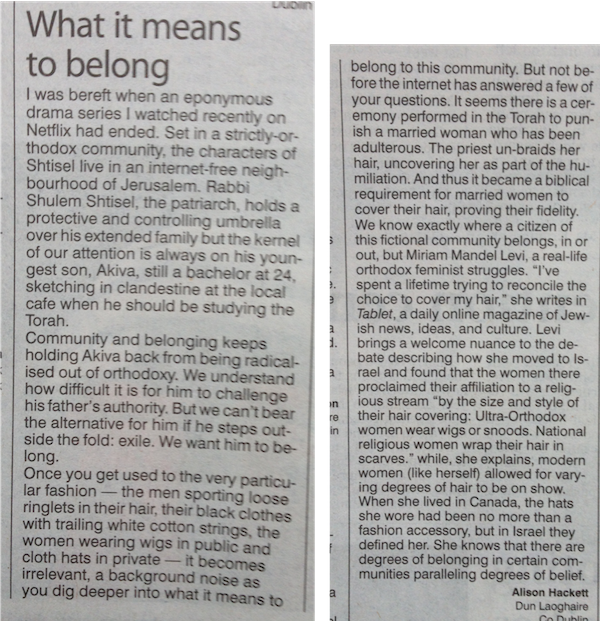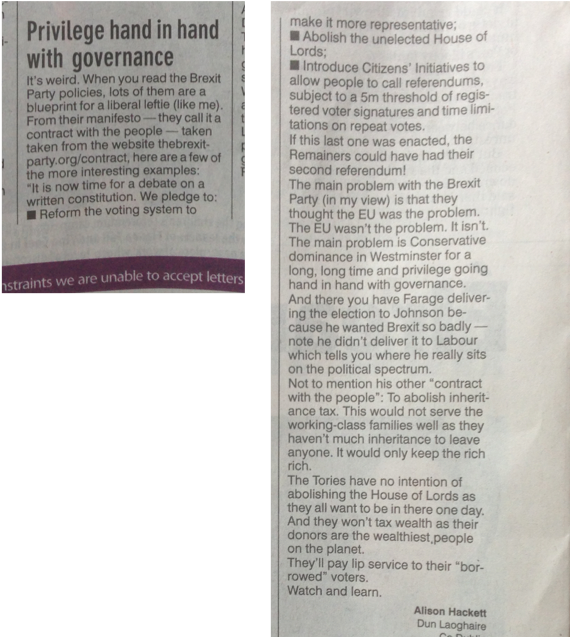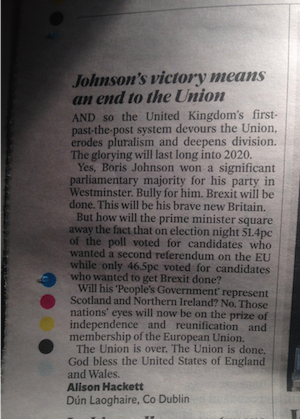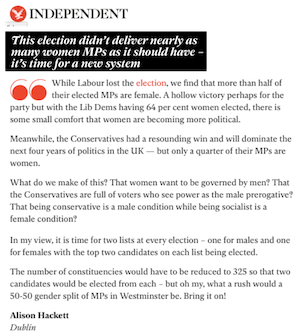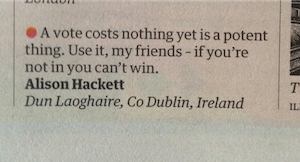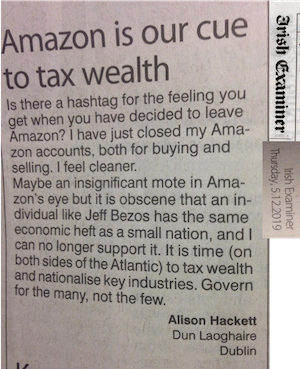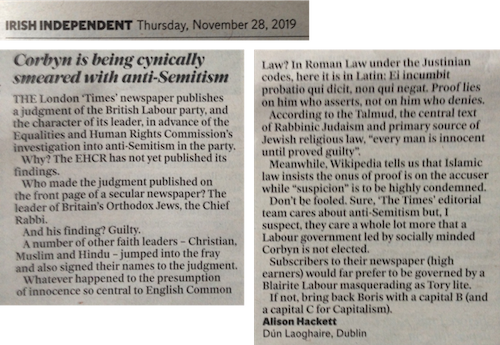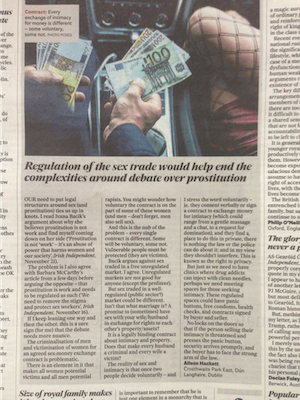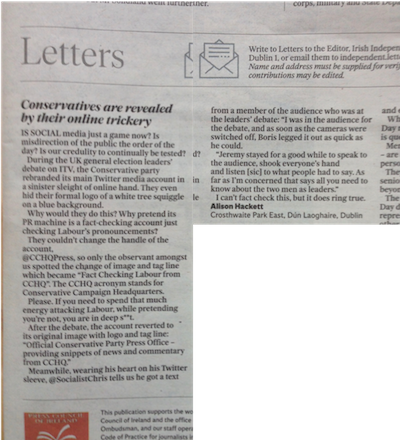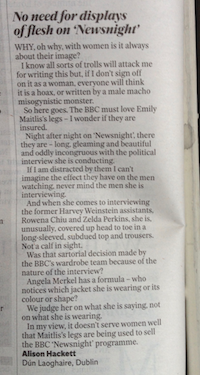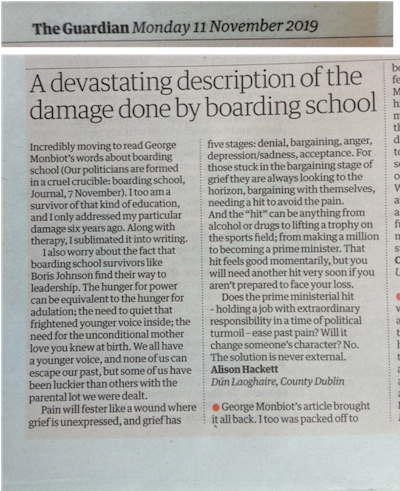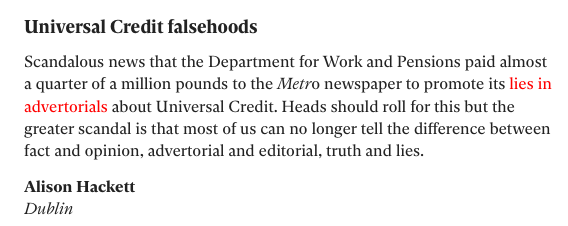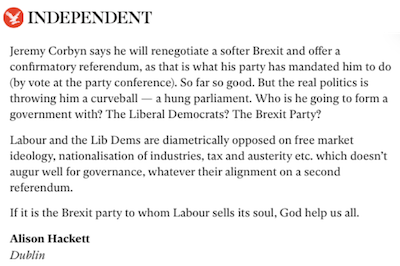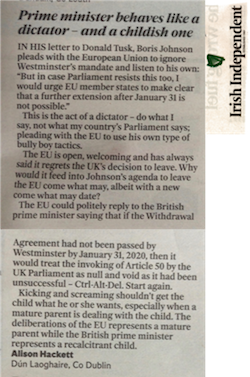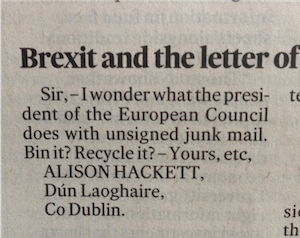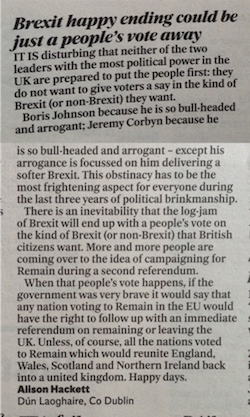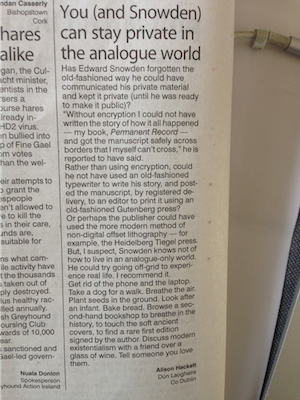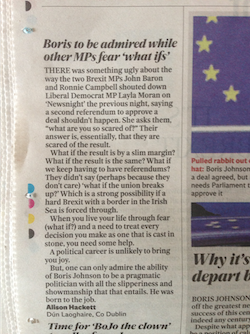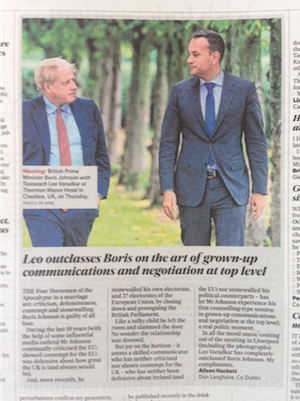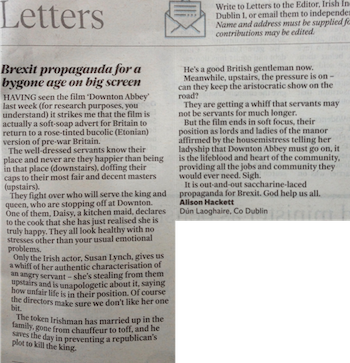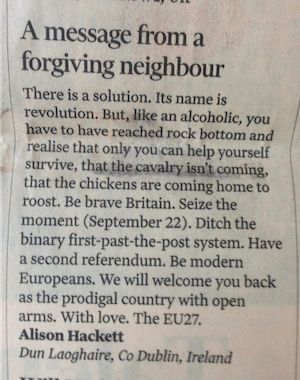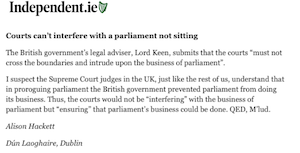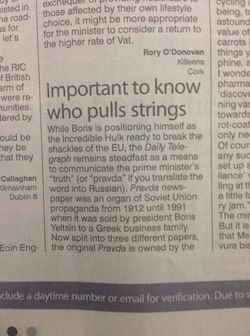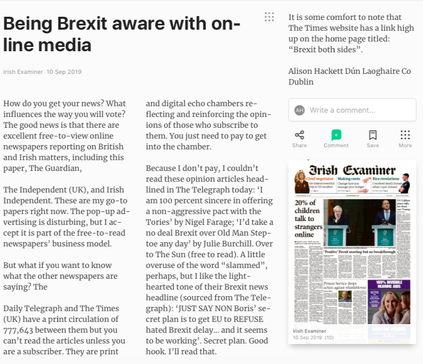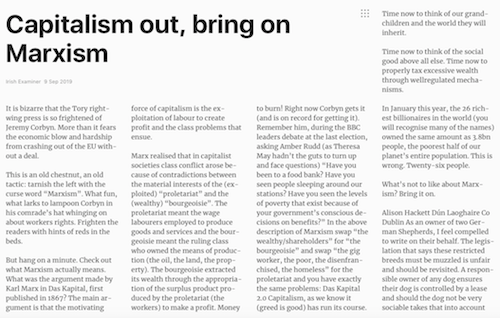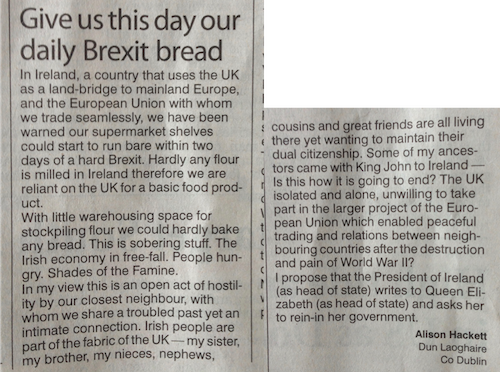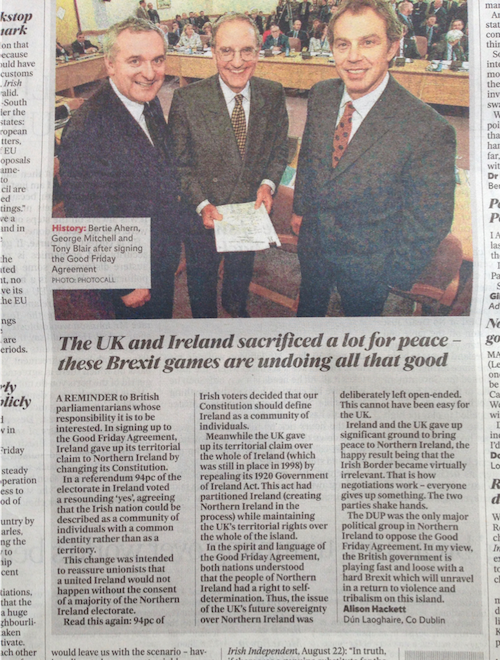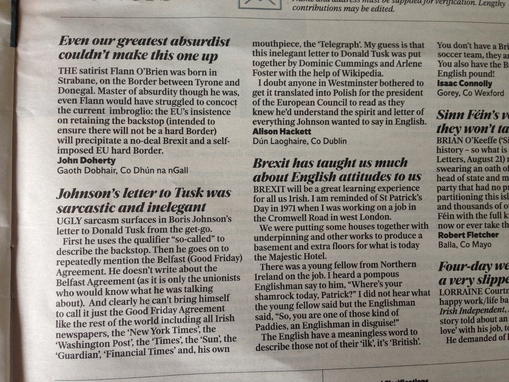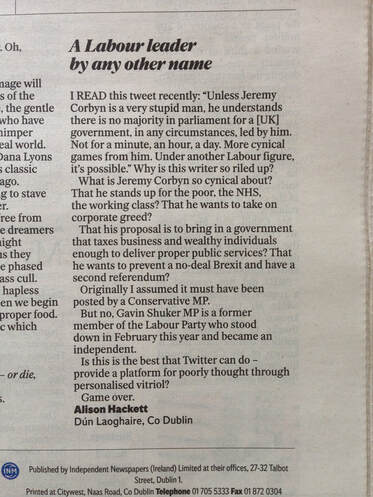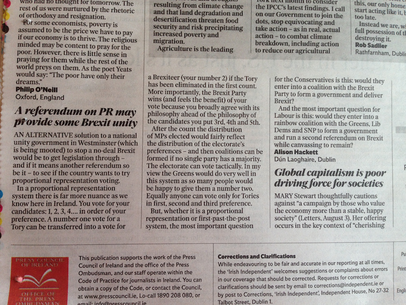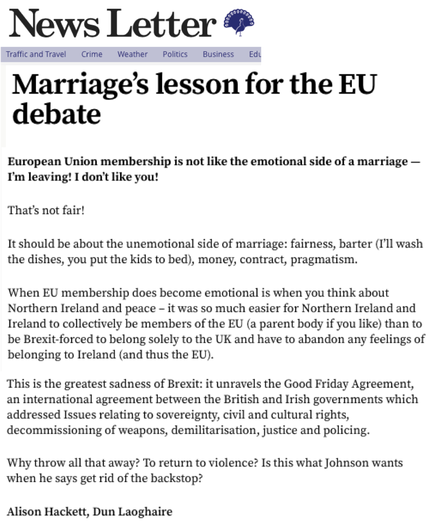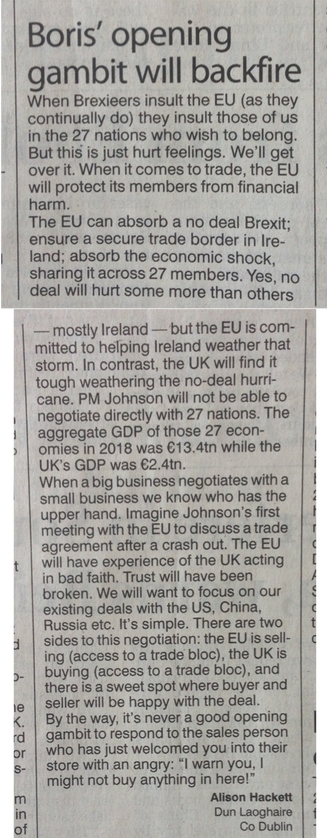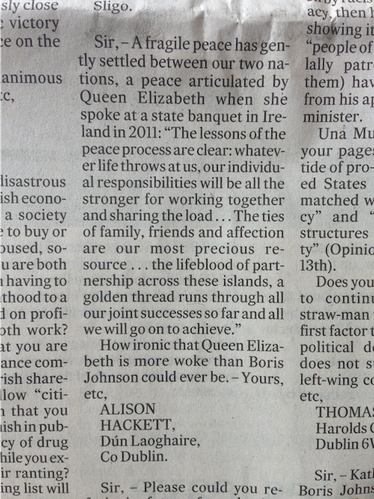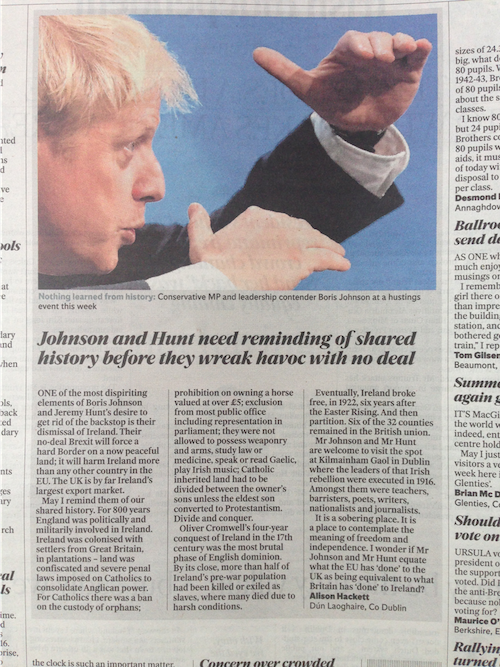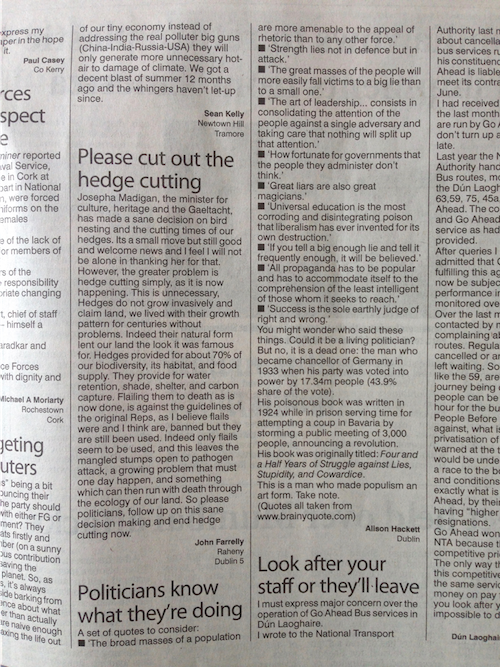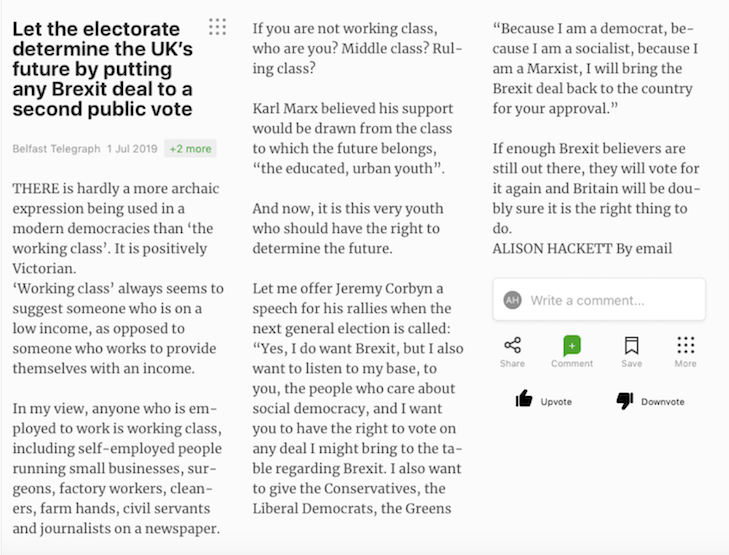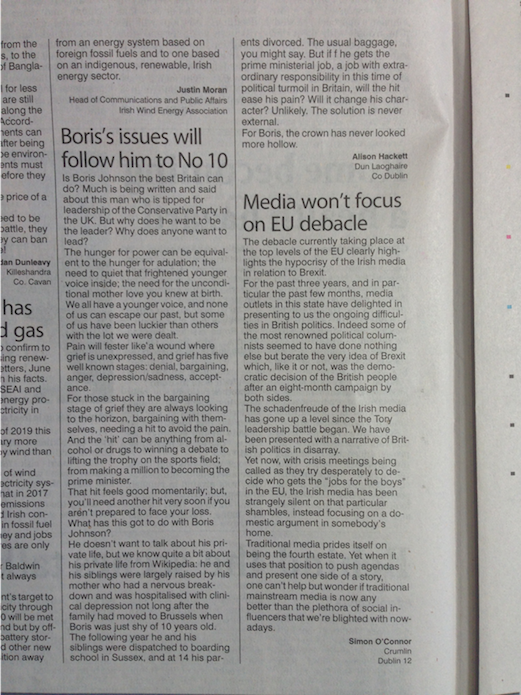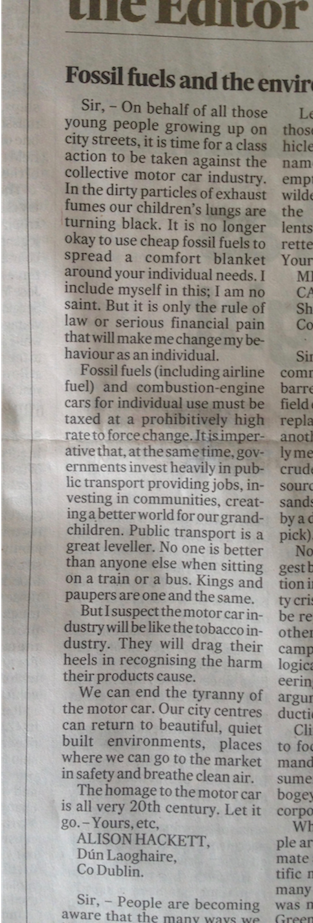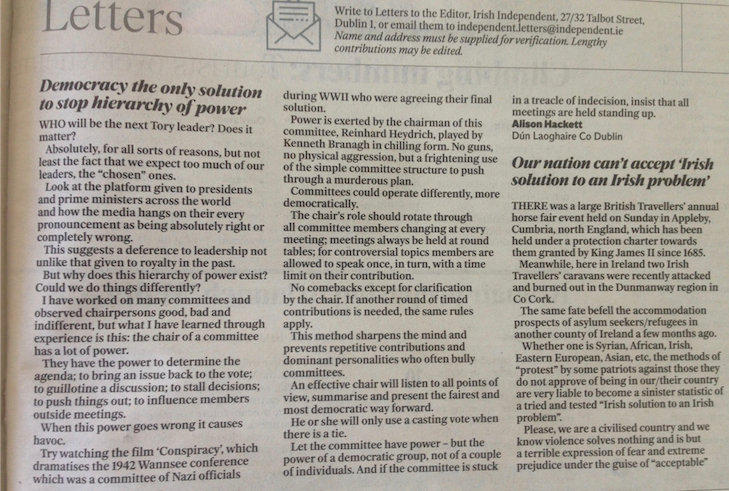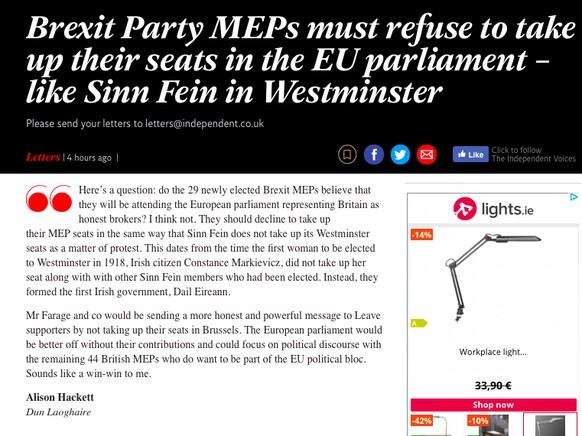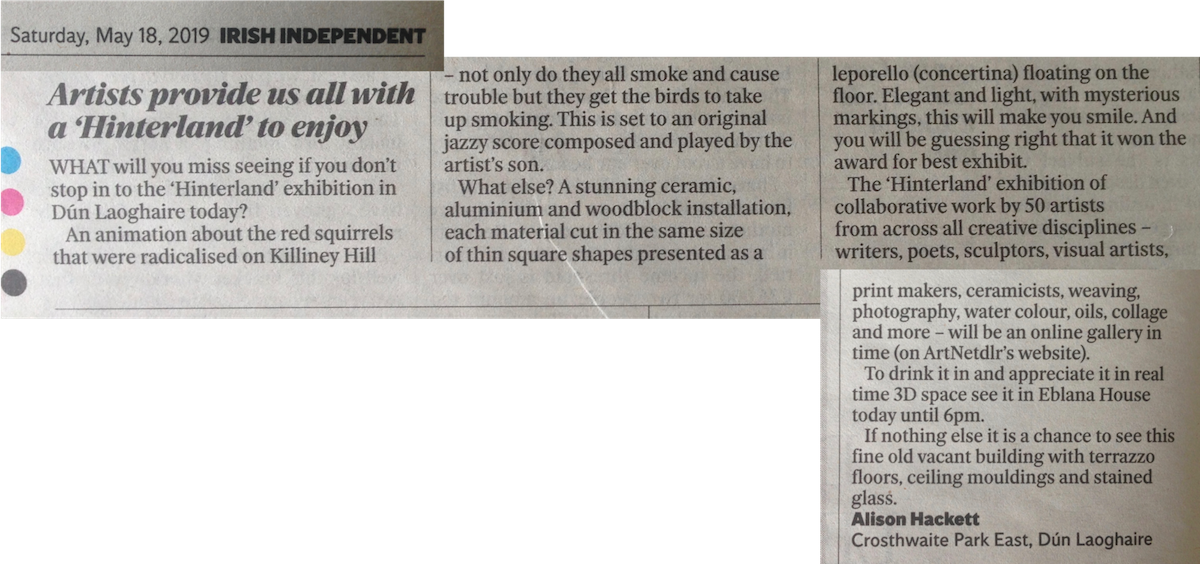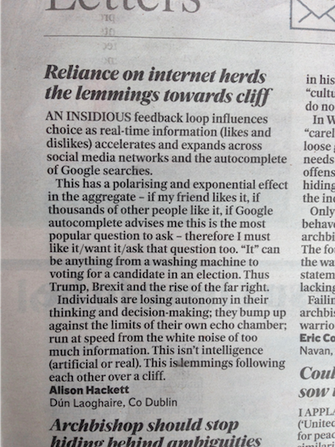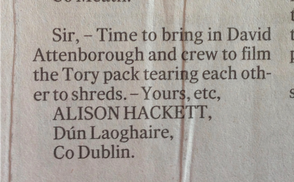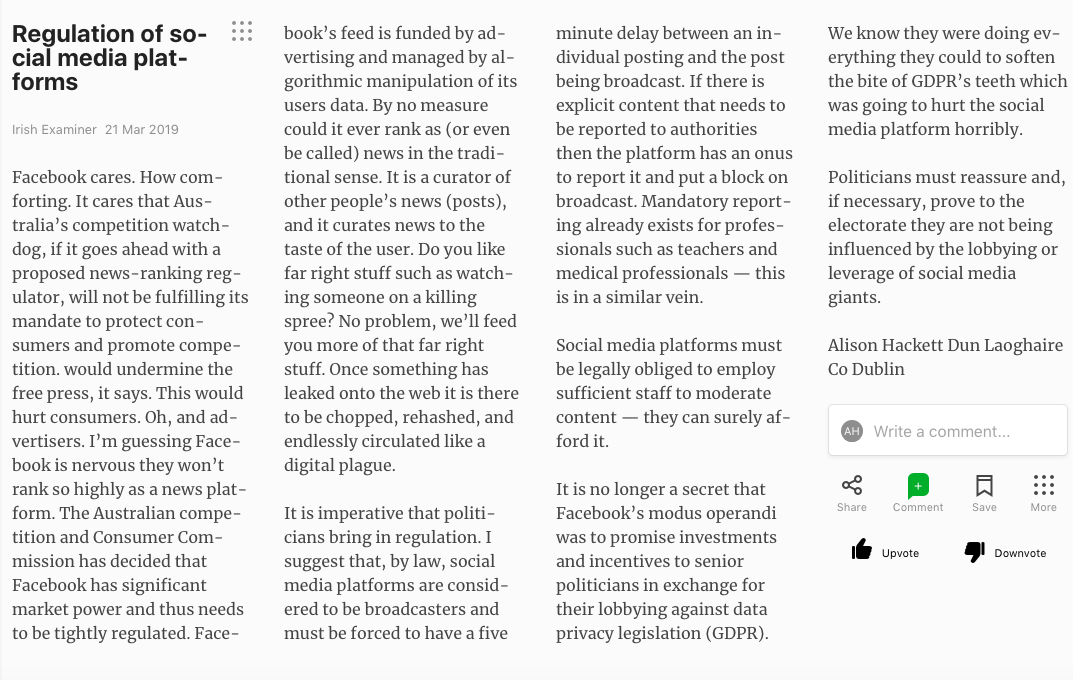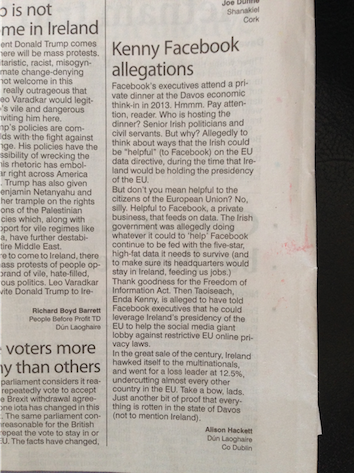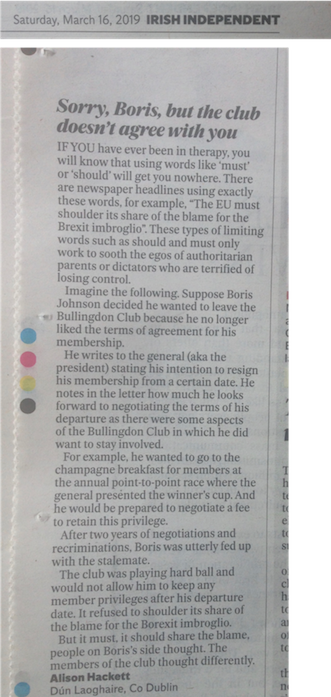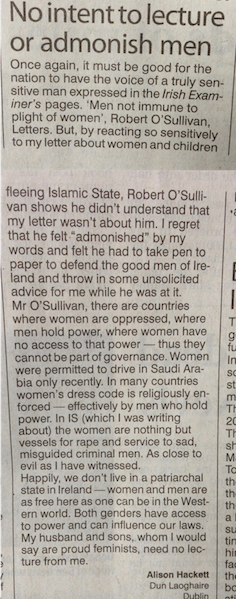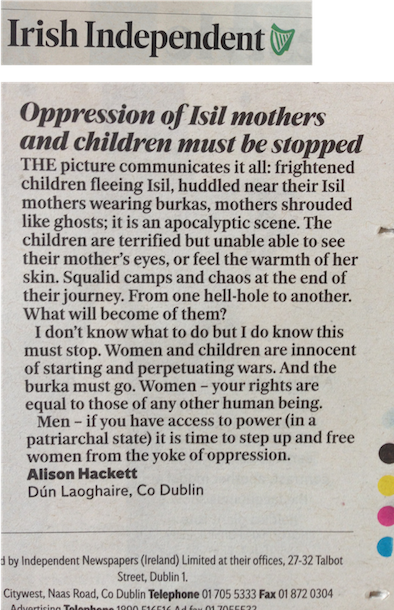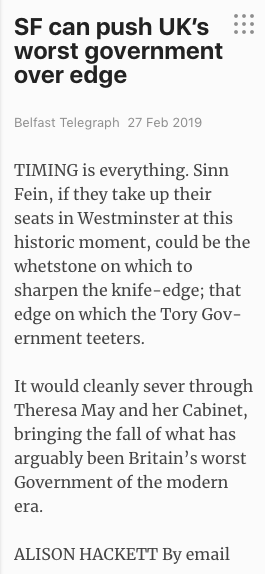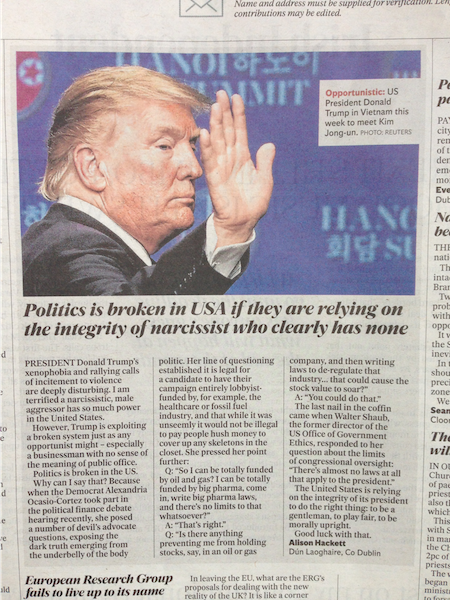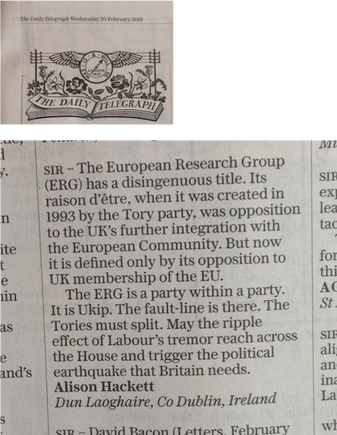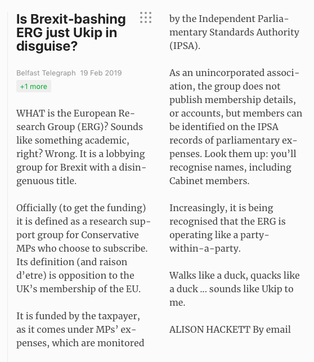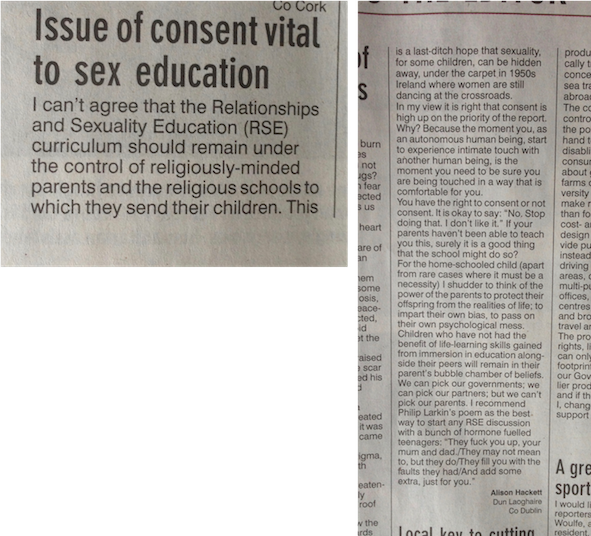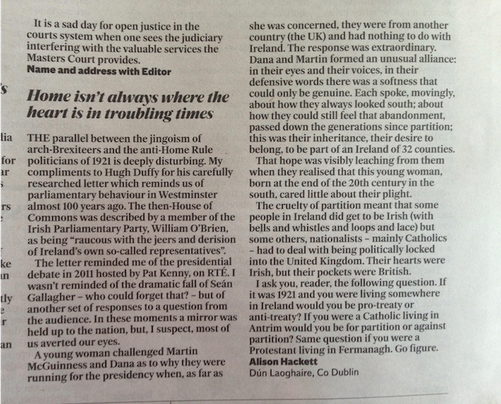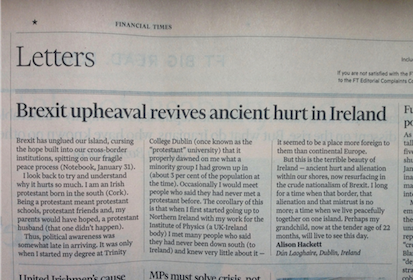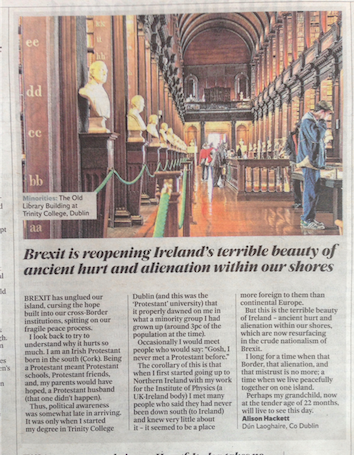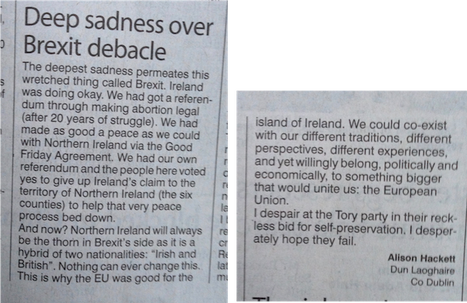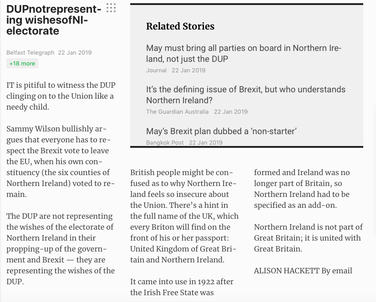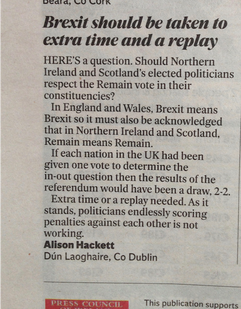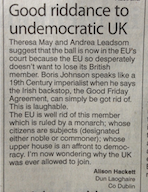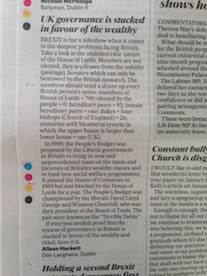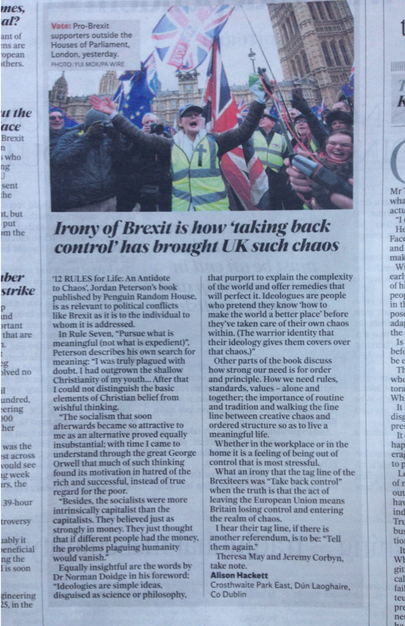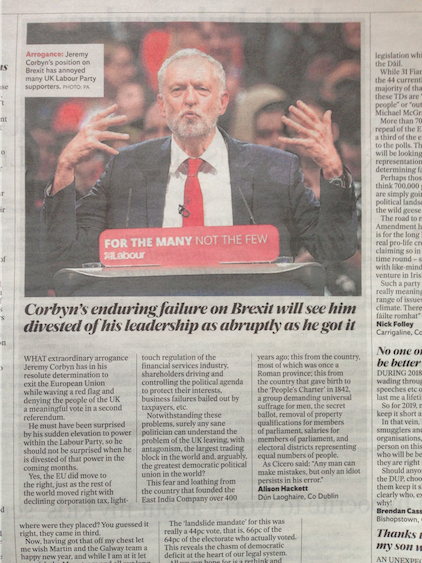Letters to the editor from Alison Hackett published in 2019 and 2020.
Irish Examiner 17 Aug 2020
It is beyond belief that the concept of keeping schools closed in September is being mooted because it would be impossible to enforce the two metre distancing with the students. Of course it’s impossible. Even 1 metre seems artificial and is pretty much the respectable norm in communicating with another person anyway. Nobody wants the personal space invader, or the lunge in for an embrace you didn’t expect.
The younger the child the closer the contact with those around them (parents, siblings, carers, teachers.) Get a whiff of your possibility for independence as a teenager and you want to spread your wings. Yes, you will probably keep in physical contact with your family — ritual embraces in greeting and departing, the comfort of a parental stroke on the head or touch on the arm. But every bone in your body, every hormone surging through you, is screaming to experiment with physical closeness with your peers.
What about the first kiss? What about learning about desire, expression of physical love with another person who is not related to you? We are driving this natural phenomenon underground.
We can expect young people to practice social distancing with strangers, to wash their hands regularly, to be more vigilant with personal hygiene (noting that there are obvious lessons to be learnt regarding sexually transmitted diseases (STDs) some of which are viruses). We can expect them to get a test for Corona, to self-isolate and protect their families if they have any of the symptoms — temperature, shortness of breath, , cough, loss of taste or smell.
But we must leave them alone now, let them be normal, let them grow up.
Irish Independent 30 May 2020
The younger the child the closer the contact with those around them (parents, siblings, carers, teachers.) Get a whiff of your possibility for independence as a teenager and you want to spread your wings. Yes, you will probably keep in physical contact with your family — ritual embraces in greeting and departing, the comfort of a parental stroke on the head or touch on the arm. But every bone in your body, every hormone surging through you, is screaming to experiment with physical closeness with your peers.
What about the first kiss? What about learning about desire, expression of physical love with another person who is not related to you? We are driving this natural phenomenon underground.
We can expect young people to practice social distancing with strangers, to wash their hands regularly, to be more vigilant with personal hygiene (noting that there are obvious lessons to be learnt regarding sexually transmitted diseases (STDs) some of which are viruses). We can expect them to get a test for Corona, to self-isolate and protect their families if they have any of the symptoms — temperature, shortness of breath, , cough, loss of taste or smell.
But we must leave them alone now, let them be normal, let them grow up.
Irish Independent 30 May 2020
Irish Examiner 30 May 2020
Oh, how outraged we all are. Unfairness is baked into the education system in the UK (but not in ours. Oh no.) And the delicious schadenfreude of witnessing the U-turn away from the algorithm. Yes, the algorithm was a fiasco in its ridiculous concept of disposing with the need for teachers and their professional opinions. Come from a posh school with historic high grades? Click. Whirr. Ah, says the algorithm, you must also be posh and will get a high grade. Open the (university) pod bay doors.
But are we really any better in Ireland? We too select based on privilege, for it is the privileged who have more of the supports to get in to university in the first place. More supports to stay with it through the degree, more supports to do a master’s in some nice location, average cost €10,000, and on to PhD. It will take something truly radical to change the prejudiced system of access to higher education evident in (most) Western democracies.
Check out Cuba, a nation which nationalised private institutions at all levels of education in 1961.
Cuba has the highest percentage of national budget in the world (13%) allocated to education. No surprise then that Cuba has achieved universal literacy. We could break the mould: End the system of State exams and CAO filtering people at the tender age of 17 or 18. seventeen or eighteen. This method cruelly bakes “success” or “failure” into the psyche of our young.
Be more like Cuba. There, on completion of the basic secondary level, education splits into two categories: Pre-university education and technical or professional training. A pre-university education leads to a bachillerato diploma (and ability to go on to complete a university degree) while completion of technical or professional training enables students to attend one of the country’s many technological institutes. Reminder — all this is publicly funded.
This system levels the playing field. Meritocratic selection/weeding out happens during third-level education, and later in professional/technical exams, as it should.
Irish Examiner 30 Apr 2020
But are we really any better in Ireland? We too select based on privilege, for it is the privileged who have more of the supports to get in to university in the first place. More supports to stay with it through the degree, more supports to do a master’s in some nice location, average cost €10,000, and on to PhD. It will take something truly radical to change the prejudiced system of access to higher education evident in (most) Western democracies.
Check out Cuba, a nation which nationalised private institutions at all levels of education in 1961.
Cuba has the highest percentage of national budget in the world (13%) allocated to education. No surprise then that Cuba has achieved universal literacy. We could break the mould: End the system of State exams and CAO filtering people at the tender age of 17 or 18. seventeen or eighteen. This method cruelly bakes “success” or “failure” into the psyche of our young.
Be more like Cuba. There, on completion of the basic secondary level, education splits into two categories: Pre-university education and technical or professional training. A pre-university education leads to a bachillerato diploma (and ability to go on to complete a university degree) while completion of technical or professional training enables students to attend one of the country’s many technological institutes. Reminder — all this is publicly funded.
This system levels the playing field. Meritocratic selection/weeding out happens during third-level education, and later in professional/technical exams, as it should.
Irish Examiner 30 Apr 2020
Independent UK 30 March 2020
ike so many, I was touched by Keelin Shanley. I first met her about four years ago. Typical of her energy and openness (not to mention her nose for a story!) she quickly found out about my background. A few of our threads were similar: Both our fathers dentists, our mothers gone. Not long afterwards she brought my work to the attention of the Arena team in RTÉ. This was quietly and subtly done — no gain for her — and a gate was opened that I would never have been able to unlatch myself. For this, I am forever grateful to her.
Imagine your life as a bag of water with a tiny leak at the bottom, and your life is passing by in moment, second by second, drop by drop. None of us knows the size of the bag we start with, when it will be drained, when the last drop is due. Will it be the next one? Or the one after? Or 10,000 drops later?
All the more reason to value every drop of life, be present in it, taste its uniqueness, cherish the moment, be present. Whether sitting in traffic, walking the pier, running a race, laughing, crying, arguing, feeling irritated, or feeling sad, it is in your hands.
Keelin savoured every drop to the end. Her spirit lives on in all who knew her. I will treasure and hold the part of her that is forever in me. May she Rest in Peace.
Irish Examiner 17 Jan 2020
Imagine your life as a bag of water with a tiny leak at the bottom, and your life is passing by in moment, second by second, drop by drop. None of us knows the size of the bag we start with, when it will be drained, when the last drop is due. Will it be the next one? Or the one after? Or 10,000 drops later?
All the more reason to value every drop of life, be present in it, taste its uniqueness, cherish the moment, be present. Whether sitting in traffic, walking the pier, running a race, laughing, crying, arguing, feeling irritated, or feeling sad, it is in your hands.
Keelin savoured every drop to the end. Her spirit lives on in all who knew her. I will treasure and hold the part of her that is forever in me. May she Rest in Peace.
Irish Examiner 17 Jan 2020
I was bereft when an eponymous drama series I watched recently on Netflix had ended. Set in a strictly-orthodox community, the characters of Shtisel live in an internet-free neighbourhood of Jerusalem. Rabbi Shulem Shtisel, the patriarch, holds a protective and controlling umbrella over his extended family but the kernel of our attention is always on his youngest son, Akiva, still a bachelor at twenty-four, sketching in clandestine at the local café when he should be studying the Torah. It is for him we are rooting as he nudges in and out of the constraints of this particular orthodoxy.
Community and belonging keeps holding Akiva back from being radicalised out of orthodoxy. We understand how difficult it is for him to challenge his father’s authority and their traditional way of life. But we can’t bear the alternative for him if he steps outside the fold: exile. We want him to belong.
Once you get used to the very particular fashion — the men sporting loose ringlets in their hair, their black clothes with trailing white cotton strings, the women wearing wigs in public and cloth hats in private — it becomes irrelevant, a background noise as you dig deeper into what it means to belong to this community. But not before the internet has answered a few of your questions. It seems there is a ceremony performed in the Torah to punish a married woman who has been adulterous. The priest un-braids her hair, uncovering her as part of the humiliation. And thus it became a biblical requirement for married women to cover their hair, proving their fidelity.
We know exactly where a citizen of this fictional community belongs, in or out, but Miriam Mandel Levi, a real life orthodox feminist struggles. “I’ve spent a lifetime trying to reconcile the choice to cover my hair,” she writes in Tablet, a daily online magazine of Jewish news, ideas, and culture. Levi brings a welcome nuance to the debate describing how she moved to Israel and found that the women there proclaimed their affiliation to a religious stream “by the size and style of their hair covering: Ultra-Orthodox women wear wigs or snoods. National religious women wrap their hair in scarves.” while, she explains, modern women (like herself) allowed for varying degrees of hair to be on show. When she lived in Canada, the hats she wore had been no more than a fashion accessory, but in Israel they defined her. She knows that there are degrees of belonging in certain communities paralleling degrees of belief.
This is the unedited text. Edited text in image. Irish Examiner 11 Feb 2020
Community and belonging keeps holding Akiva back from being radicalised out of orthodoxy. We understand how difficult it is for him to challenge his father’s authority and their traditional way of life. But we can’t bear the alternative for him if he steps outside the fold: exile. We want him to belong.
Once you get used to the very particular fashion — the men sporting loose ringlets in their hair, their black clothes with trailing white cotton strings, the women wearing wigs in public and cloth hats in private — it becomes irrelevant, a background noise as you dig deeper into what it means to belong to this community. But not before the internet has answered a few of your questions. It seems there is a ceremony performed in the Torah to punish a married woman who has been adulterous. The priest un-braids her hair, uncovering her as part of the humiliation. And thus it became a biblical requirement for married women to cover their hair, proving their fidelity.
We know exactly where a citizen of this fictional community belongs, in or out, but Miriam Mandel Levi, a real life orthodox feminist struggles. “I’ve spent a lifetime trying to reconcile the choice to cover my hair,” she writes in Tablet, a daily online magazine of Jewish news, ideas, and culture. Levi brings a welcome nuance to the debate describing how she moved to Israel and found that the women there proclaimed their affiliation to a religious stream “by the size and style of their hair covering: Ultra-Orthodox women wear wigs or snoods. National religious women wrap their hair in scarves.” while, she explains, modern women (like herself) allowed for varying degrees of hair to be on show. When she lived in Canada, the hats she wore had been no more than a fashion accessory, but in Israel they defined her. She knows that there are degrees of belonging in certain communities paralleling degrees of belief.
This is the unedited text. Edited text in image. Irish Examiner 11 Feb 2020
Looking back on the turbulent year of 2019 one of the things that struck me most was how broadcast journalists had to get a "gotcha" moment.
Will you apologise? Will you apologise? Apologise! Followed by endless derivative news cycles about the fact that he or she did or didn't apologise. Yawn. Double yawn.
I was longing for an in-depth conversation about the actual political parties and their ideologies during the British general election. One solution is to let artificial intelligence (AI) presenters do the questioning. Here are the AI questions I'd like to have seen the party leaders asked. Only single word answers permitted or the program crashes:
:: Do you agree with the British government licensing the export of military equipment to the gulf when it is known that the arms will be used in airstrikes that kill civilians?
:: Do you agree with taxing high net wealth individuals to support public services?
:: Would you have made the same decision as Margaret Thatcher made to defend the Falklands?
:: Would you have made the same decision as Tony Blair to go into Iraq?
:: Do you agree with privatising the probation service?
:: Do you believe segregation of schooling (by gender, religion or wealth) creates more or less harmony in society?
:: Did you feel momentarily happy or sad when you heard Osama bin Laden had been killed?
With this kind of Q&A, the electoral algorithm might have spit out an entirely different result.
Irish Independent 4 Jan 2020
Will you apologise? Will you apologise? Apologise! Followed by endless derivative news cycles about the fact that he or she did or didn't apologise. Yawn. Double yawn.
I was longing for an in-depth conversation about the actual political parties and their ideologies during the British general election. One solution is to let artificial intelligence (AI) presenters do the questioning. Here are the AI questions I'd like to have seen the party leaders asked. Only single word answers permitted or the program crashes:
:: Do you agree with the British government licensing the export of military equipment to the gulf when it is known that the arms will be used in airstrikes that kill civilians?
:: Do you agree with taxing high net wealth individuals to support public services?
:: Would you have made the same decision as Margaret Thatcher made to defend the Falklands?
:: Would you have made the same decision as Tony Blair to go into Iraq?
:: Do you agree with privatising the probation service?
:: Do you believe segregation of schooling (by gender, religion or wealth) creates more or less harmony in society?
:: Did you feel momentarily happy or sad when you heard Osama bin Laden had been killed?
With this kind of Q&A, the electoral algorithm might have spit out an entirely different result.
Irish Independent 4 Jan 2020
It's weird. When you read the Brexit Party policies lots of them are a blueprint for a liberal leftie (like me). From their manifesto — they call it a contract with the people — here are a few of the more interesting examples:*
"It is now time for a debate on a written constitution. We pledge to: • Reform the voting system to make it more representative; • Abolish the unelected House of Lords; • Introduce Citizens’ Initiatives to allow people to call referendums, subject to a 5m threshold of registered voter signatures and time limitations on repeat votes."
If this last one was enacted the Remainers could have had their 2nd referendum!
The main problem with the Brexit party (in my view) is that they thought the EU was the problem. The EU wasn't the problem. It isn't. The main problem is Conservative dominance in Westminster for a long long time and privilege going hand in hand with governance.
And there you have Farage delivering the election to Johnson because he wanted Brexit so badly - note he didn't deliver it to Labour which tells you where he really sits on the political spectrum. Not to mention his other “contract with the people”: to abolish inheritance tax. This would not serve the working class families well as they haven’t much inheritance to leave anyone. It would only keep the rich rich.
The Tories have no intention of abolishing the House of Lords as they all want to be in there one day. And they won't tax wealth as their donors are the wealthiest people on the planet. They’ll pay lip service to their “borrowed” voters. Watch and learn.
Irish Examiner 21 Dec 2019
"It is now time for a debate on a written constitution. We pledge to: • Reform the voting system to make it more representative; • Abolish the unelected House of Lords; • Introduce Citizens’ Initiatives to allow people to call referendums, subject to a 5m threshold of registered voter signatures and time limitations on repeat votes."
If this last one was enacted the Remainers could have had their 2nd referendum!
The main problem with the Brexit party (in my view) is that they thought the EU was the problem. The EU wasn't the problem. It isn't. The main problem is Conservative dominance in Westminster for a long long time and privilege going hand in hand with governance.
And there you have Farage delivering the election to Johnson because he wanted Brexit so badly - note he didn't deliver it to Labour which tells you where he really sits on the political spectrum. Not to mention his other “contract with the people”: to abolish inheritance tax. This would not serve the working class families well as they haven’t much inheritance to leave anyone. It would only keep the rich rich.
The Tories have no intention of abolishing the House of Lords as they all want to be in there one day. And they won't tax wealth as their donors are the wealthiest people on the planet. They’ll pay lip service to their “borrowed” voters. Watch and learn.
Irish Examiner 21 Dec 2019
While Labour lost the election we find that more than half their MPs that were elected are female. A hollow victory perhaps for the party but with the Lib Dems having 64% women elected there is some small comfort that women are becoming more political. Meanwhile the conservatives had a resounding win and will dominate the next four years of politics in the UK — but only a quarter of their MPs are women.
What do we make of this? That women want to be governed by men? That the Conservatives are full of incels and incel voters who see power as the male prerogative? That being conservative is a male condition while being socialist is a female condition? In my view it is time for two lists at every election — one for males and one for females with the top two candidates on each list being elected. The number of constituencies would have to be reduced to 325 so that two candidates would be elected from each — but oh my, what a rush — 50% of MPs in Westminster being female and 50% being male. Bring it on!
Irish Independent; Irish Examiner141219
What do we make of this? That women want to be governed by men? That the Conservatives are full of incels and incel voters who see power as the male prerogative? That being conservative is a male condition while being socialist is a female condition? In my view it is time for two lists at every election — one for males and one for females with the top two candidates on each list being elected. The number of constituencies would have to be reduced to 325 so that two candidates would be elected from each — but oh my, what a rush — 50% of MPs in Westminster being female and 50% being male. Bring it on!
Irish Independent; Irish Examiner141219
While Labour lost the election, we find that more than half of their elected MPs are female. A hollow victory perhaps for the party but with the Lib Dems having 64 per cent women elected, there is some small comfort that women are becoming more political.
Meanwhile, the Conservatives had a resounding win and will dominate the next four years of politics in the UK — but only a quarter of their MPs are women. What do we make of this? That women want to be governed by men? That the Conservatives are full of voters who see power as the male prerogative? That being Conservative is a male condition while being socialist is a female condition?
In my view, it is time for two lists at every election – one for males and one for females with the top two candidates on each list being elected. The number of constituencies would have to be reduced to 325 so that two candidates would be elected from each – but oh my, what a rush would a 50-50 gender split of MPs in Westminster be. Bring it on!
Independent UK 13 Dec 2019
Meanwhile, the Conservatives had a resounding win and will dominate the next four years of politics in the UK — but only a quarter of their MPs are women. What do we make of this? That women want to be governed by men? That the Conservatives are full of voters who see power as the male prerogative? That being Conservative is a male condition while being socialist is a female condition?
In my view, it is time for two lists at every election – one for males and one for females with the top two candidates on each list being elected. The number of constituencies would have to be reduced to 325 so that two candidates would be elected from each – but oh my, what a rush would a 50-50 gender split of MPs in Westminster be. Bring it on!
Independent UK 13 Dec 2019
There is a moral hazard that Labour will lose the election because Corbyn is serious, honest, boring and principled while the Conservatives will win it because Johnson is a bit of fun, the buffoon you wouldn't mind having at a dinner party, and you can’t help liking him. A vote costs nothing yet is a potent thing. Use it my friends — if you’re not in you can’t win.
Guardian 13 Dec 2019
Guardian 13 Dec 2019
Is there a hashtag for the feeling you get when you have decided to leave Amazon? I have just closed my Amazon accounts, both for buying and selling. I feel cleaner.
Maybe an insignificant mote in Amazon’s eye but it is obscene that an individual like Jeff Bezos has the same economic heft as a small nation and I can no longer support it. It is time (on both sides of the Atlantic) to tax wealth and nationalise key industries. Govern for the many, not the few.
Elizabeth Warren and Jeremy Corbyn are now our only hope.
Irish Examiner 05 Dec 2019
Maybe an insignificant mote in Amazon’s eye but it is obscene that an individual like Jeff Bezos has the same economic heft as a small nation and I can no longer support it. It is time (on both sides of the Atlantic) to tax wealth and nationalise key industries. Govern for the many, not the few.
Elizabeth Warren and Jeremy Corbyn are now our only hope.
Irish Examiner 05 Dec 2019
The Times newspaper publishes a judgment of the Labour party, and the character of its leader, in advance of the Equalities and Human Rights Commission’s investigation into antisemitism in the party. Why? The EHCR has not yet published its findings. Who made the judgment published on the front page of a secular newspaper? The leader of Britain’s Orthodox Jews, the Chief Rabbi. And his finding? Guilty.
A number of other faith leaders — Christian, Muslim and Hindu — jumped into the fray and also signed their names to the judgment.
Whatever happened to the presumption of innocence so central to English Common Law? In Roman Law under the Justinian codes here it is in Latin: Ei incumbit probatio qui dicit, non qui negat. Proof lies on him who asserts, not on him who denies. According to the Talmud, the central text of Rabbinic Judaism and primary source of Jewish religious law, "every man is innocent until proved guilty.” Meanwhile Wikipedia tells us that Islamic law insists the onus of proof is on the accuser while "suspicion" is to be highly condemned.
Don’t be fooled. Sure, The Times’ editorial team cares about antisemitism, but, I suspect they care a whole lot more that a Labour government led by socially minded Corbyn is not elected. Subscribers to their newspaper (high earners) would far prefer to be governed by a Blairite Labour masquerading as Tory lite.
If not, bring back Boris with a capital B (and a capital C for Capitalism).
Irish Independent 28 November 2019
A number of other faith leaders — Christian, Muslim and Hindu — jumped into the fray and also signed their names to the judgment.
Whatever happened to the presumption of innocence so central to English Common Law? In Roman Law under the Justinian codes here it is in Latin: Ei incumbit probatio qui dicit, non qui negat. Proof lies on him who asserts, not on him who denies. According to the Talmud, the central text of Rabbinic Judaism and primary source of Jewish religious law, "every man is innocent until proved guilty.” Meanwhile Wikipedia tells us that Islamic law insists the onus of proof is on the accuser while "suspicion" is to be highly condemned.
Don’t be fooled. Sure, The Times’ editorial team cares about antisemitism, but, I suspect they care a whole lot more that a Labour government led by socially minded Corbyn is not elected. Subscribers to their newspaper (high earners) would far prefer to be governed by a Blairite Labour masquerading as Tory lite.
If not, bring back Boris with a capital B (and a capital C for Capitalism).
Irish Independent 28 November 2019
Our need to put legal structures around sex (and prostitution) ties us up in knots. I read Ivana Bacik’s argument about why she believes prostitution is not work and find myself coming down on her side. (“Prostitution is not work, Nov 21st) The problem is, I also agree with Barbara McCarthy's article from a few days before arguing the opposite — that prostitution is work and needs to be regulated as such. (“We need to remove the stigma and protect sex workers.” Nov 16th). If I keep leaning one way and then the other this is a sure sign (for me) that the debate needs more nuance.
The criminalisation of men and victimisation of women for an agreed sex-money exchange contract is problematic. There is an element in it that makes all women potential victims and all men potential rapists. You might wonder how voluntary the contract is on the part of some of these women (and men — don’t forget, men also sell sex). And this is the nub of the problem — every single contract is different. Some will be voluntary, some not. Vulnerable people must be protected (they are victims). Bacik argues against sex traded in a free unregulated market. I agree. Unregulated markets are not good for anyone (except the profiteer).
But sex traded in a well-regulated (public sector?) market could be different. Isn't that what marriage is? A promise to (sometimes) have sex with your wife/husband in exchange for rights to each other's property/assets? It is a legally binding contract about intimacy and property. Does that make every husband a criminal and every wife a victim?
The reality of sex and intimacy is that once two people decide voluntarily — and I stress the word voluntarily — i.e. they consent verbally or sign a contract to exchange money for intimacy (which could range from a gentle massage and a chat, to a request for domination, to the old fashioned missionary position, and they find a place to do this in private, there is nothing the law or the police can do about it; and in my view they shouldn’t interfere. This is known as the right to privacy.
But just as we need to have clinics where drug addicts can inject with clean needles perhaps we need meeting spaces for those seeking intimacy. These regulated spaces could have panic buttons, free condoms, health checks, and contracts signed by buyer and seller. No locks on the doors so that if the person selling their intimacy is threatened and presses the panic button, security arrives promptly, and the buyer has to face the strong arm of the law.
Irish Independent 23 November 2019
The criminalisation of men and victimisation of women for an agreed sex-money exchange contract is problematic. There is an element in it that makes all women potential victims and all men potential rapists. You might wonder how voluntary the contract is on the part of some of these women (and men — don’t forget, men also sell sex). And this is the nub of the problem — every single contract is different. Some will be voluntary, some not. Vulnerable people must be protected (they are victims). Bacik argues against sex traded in a free unregulated market. I agree. Unregulated markets are not good for anyone (except the profiteer).
But sex traded in a well-regulated (public sector?) market could be different. Isn't that what marriage is? A promise to (sometimes) have sex with your wife/husband in exchange for rights to each other's property/assets? It is a legally binding contract about intimacy and property. Does that make every husband a criminal and every wife a victim?
The reality of sex and intimacy is that once two people decide voluntarily — and I stress the word voluntarily — i.e. they consent verbally or sign a contract to exchange money for intimacy (which could range from a gentle massage and a chat, to a request for domination, to the old fashioned missionary position, and they find a place to do this in private, there is nothing the law or the police can do about it; and in my view they shouldn’t interfere. This is known as the right to privacy.
But just as we need to have clinics where drug addicts can inject with clean needles perhaps we need meeting spaces for those seeking intimacy. These regulated spaces could have panic buttons, free condoms, health checks, and contracts signed by buyer and seller. No locks on the doors so that if the person selling their intimacy is threatened and presses the panic button, security arrives promptly, and the buyer has to face the strong arm of the law.
Irish Independent 23 November 2019
Is social media just a game now? Is misdirection of the public the order of the day? Is our credulity to continually be tested? During the UK general election leaders’ debate on ITV, the Conservative party rebranded its main Twitter media account in a sinister sleight of online hand. They even hid their formal logo of a white tree squiggle on a blue background.
Why would they do this? Why pretend its PR machine is a fact-checking account just checking Labour’s pronouncements?
They couldn’t change the handle of the account, @CCHQPress, so only the observant amongst us spotted the change of image and tag line which became “Fact Checking Labour from CCHQ”. The CCHQ acronym stands for Conservative Campaign Headquarters.
Please. If you need to spend that much energy attacking Labour, while pretending you’re not, you are in deep s**t.
After the debate, the account reverted to its original image with logo and tag line: “Official Conservative Party Press Office – providing snippets of news and commentary from CCHQ.”
Meanwhile, wearing his heart on his Twitter sleeve, @SocialistChris tells us he got a text from a member of the audience who was at the leaders’ debate: “I was in the audience for the debate, and as soon as the cameras were switched off, Boris legged it out as quick as he could.
“Jeremy stayed for a good while to speak to the audience, shook everyone’s hand and listen [sic] to what people had to say. As far as I’m concerned that says all you need to know about the two men as leaders.”
I can’t fact check this, but it does ring true.
Irish Independent 21 November 2019
Why would they do this? Why pretend its PR machine is a fact-checking account just checking Labour’s pronouncements?
They couldn’t change the handle of the account, @CCHQPress, so only the observant amongst us spotted the change of image and tag line which became “Fact Checking Labour from CCHQ”. The CCHQ acronym stands for Conservative Campaign Headquarters.
Please. If you need to spend that much energy attacking Labour, while pretending you’re not, you are in deep s**t.
After the debate, the account reverted to its original image with logo and tag line: “Official Conservative Party Press Office – providing snippets of news and commentary from CCHQ.”
Meanwhile, wearing his heart on his Twitter sleeve, @SocialistChris tells us he got a text from a member of the audience who was at the leaders’ debate: “I was in the audience for the debate, and as soon as the cameras were switched off, Boris legged it out as quick as he could.
“Jeremy stayed for a good while to speak to the audience, shook everyone’s hand and listen [sic] to what people had to say. As far as I’m concerned that says all you need to know about the two men as leaders.”
I can’t fact check this, but it does ring true.
Irish Independent 21 November 2019
Why, oh why with women is always about their image? I know all sorts of trolls will attack me for writing this but, if I don’t sign off on it as a woman everyone will think it is a hoax, or written by a male macho misogynistic monster. So here goes. The BBC must love Emily Maitlis’s legs — I wonder are they insured. Night after night on Newsnight there they are long, gleaming and beautiful and oddly incongruous with the political interview she is conducting. If I am distracted by them I can’t imagine the effect they have on the men watching, never mind the men she is interviewing. And when she comes to interviewing the former Harvey Weinstein assistants, Rowena Chiu and Zelda Perkins, she is, unusually, covered up head to toe in a long sleeved subdued top and trousers. Not a calf in sight. Was that sartorial decision made by the BBC’s wardrobe team because of the nature of the interview?
Angela Merkel has a formula — who notices which jacket she is wearing or its colour or shape? We judge her on what she is saying, not on what she is wearing.
In my view it doesn’t serve women well that Maitlis’s legs are being used to sell the BBC Newsnight programme.
Irish Independent 16 November 2019
Angela Merkel has a formula — who notices which jacket she is wearing or its colour or shape? We judge her on what she is saying, not on what she is wearing.
In my view it doesn’t serve women well that Maitlis’s legs are being used to sell the BBC Newsnight programme.
Irish Independent 16 November 2019
Incredibly moving to read George Montbiot’s words about boarding school. I too am a survivor of that kind of education and only addressed my particular damage six years ago. Along with therapy I sublimated it into writing.
I too worry about the fact the boarding school survivors like Boris Johnson find their way to leadership. The hunger for power can be equivalent to the hunger for adulation; the need to quiet that frightened younger voice inside; the need for the unconditional mother love you knew at birth. We all have a younger voice, and none of us can escape our past, but some of us have been luckier than others with the parental lot we were dealt.
Pain will fester like a wound where grief is unexpressed, and grief has five well known stages: denial, bargaining, anger, depression/sadness, acceptance. For those people stuck in the bargaining stage of grief they are always looking to the horizon, bargaining with themselves, needing a hit to avoid the pain. And the ‘hit’ can be anything from alcohol or drugs to winning a debate to lifting the trophy on the sports field; from making a million to becoming the prime minister. That hit feels good momentarily; but, you’ll need another hit very soon if you aren’t prepared to face your loss.
Does the prime ministerial hit, holding a job with extraordinary responsibility in this time of political turmoil in Britain, does that hit ease Boris Johnson's pain? Will it change his character? No. The solution is never external.
The Guardian 11 Nov 2019
I too worry about the fact the boarding school survivors like Boris Johnson find their way to leadership. The hunger for power can be equivalent to the hunger for adulation; the need to quiet that frightened younger voice inside; the need for the unconditional mother love you knew at birth. We all have a younger voice, and none of us can escape our past, but some of us have been luckier than others with the parental lot we were dealt.
Pain will fester like a wound where grief is unexpressed, and grief has five well known stages: denial, bargaining, anger, depression/sadness, acceptance. For those people stuck in the bargaining stage of grief they are always looking to the horizon, bargaining with themselves, needing a hit to avoid the pain. And the ‘hit’ can be anything from alcohol or drugs to winning a debate to lifting the trophy on the sports field; from making a million to becoming the prime minister. That hit feels good momentarily; but, you’ll need another hit very soon if you aren’t prepared to face your loss.
Does the prime ministerial hit, holding a job with extraordinary responsibility in this time of political turmoil in Britain, does that hit ease Boris Johnson's pain? Will it change his character? No. The solution is never external.
The Guardian 11 Nov 2019
Scandalous news that the Department for Work and Pensions in the UK pays almost a quarter of a million pounds to the Metro newspaper to promote its lies in advertorials (that is something pretending to be editorial) about Universal Credit. Heads should roll for this but the greater scandal is that most of us can no longer tell the difference between fact and opinion, advertorial and editorial, truth and lies.
Independent UK 06 November 2019
Independent UK 06 November 2019
Jeremy Corbyn says he will renegotiate a softer Brexit and offer a confirmatory referendum as that is what his party has mandated him to do (by vote at the party conference). So far so good. But the real politic is throwing him a curveball — a hung parliament.
Who is he going to form a government with? The Liberal Democrats? The Brexit party?
Labour and the Lib Dems are diametrically opposed on free market ideology, nationalisation of industries, tax and austerity etc. which doesn’t augur well for governance whatever their alignment on a second referendum.
If it is the Brexit party to whom Labour sells its soul, God help us all.
Independent UK 05 November 2019
Who is he going to form a government with? The Liberal Democrats? The Brexit party?
Labour and the Lib Dems are diametrically opposed on free market ideology, nationalisation of industries, tax and austerity etc. which doesn’t augur well for governance whatever their alignment on a second referendum.
If it is the Brexit party to whom Labour sells its soul, God help us all.
Independent UK 05 November 2019
During his last PMQs Boris Johnson said he was about standing up for the police, the economy and wealth creators. Wealth creators! I think he means big business owners and shareholders. Meanwhile we hear about a children’s book just published “It’s a No-Money Day” by Kate Milner which is about families coping with hunger and poverty. This should shame us all into activism. No better place to start than the British general election.
Check out the Westminster voting records of the three wannabe prime ministers: Jeremy Corbyn, Boris Johnson and Jo Swinson. You will find that Swinson & Johnson are perfectly aligned (while diametrically opposed to Corbyn) on supporting hard right reduce-the-state measures—ten years of austerity, cutting council and school budgets, increasing student loans, reducing police and firefighters numbers by 20,000 and 10,000 respectively. The only difference in their views is about Brexit. Johnson supports Leave. Swinson supports Remain.
And while Corbyn is on record as supporting the building of affordable homes for all, progressive taxation, investment to rebuild forgotten towns, and the protection and extension of worker’s rights, Johnson and Swinson are on record for opposition to these proposals.
In terms of Brexit, Corbyn supports both remain and leave voters (I know, difficult to get your head around this, but it is an honest and legitimate view). He wanted a softer Brexit staying in the custom’s union to honour the referendum but keeping most people on board with less harm to economy. Above all he wants a socialist government to not only support the business community and growth but to include a safety net for the weak and marginalised and to create a fairer society through the vehicle of socialism - thinking of the social good. Caring capitalism. He also supports a confirmatory referendum.
This is the only way to help the hungry now and put children’s books about hunger and poverty into the realm of fiction. Vote tactically to get rid of the hard right who will always protect the people at the top of the pile. Give Labour a chance to govern and look after the many.
Irish Examiner 02 November 2019
Check out the Westminster voting records of the three wannabe prime ministers: Jeremy Corbyn, Boris Johnson and Jo Swinson. You will find that Swinson & Johnson are perfectly aligned (while diametrically opposed to Corbyn) on supporting hard right reduce-the-state measures—ten years of austerity, cutting council and school budgets, increasing student loans, reducing police and firefighters numbers by 20,000 and 10,000 respectively. The only difference in their views is about Brexit. Johnson supports Leave. Swinson supports Remain.
And while Corbyn is on record as supporting the building of affordable homes for all, progressive taxation, investment to rebuild forgotten towns, and the protection and extension of worker’s rights, Johnson and Swinson are on record for opposition to these proposals.
In terms of Brexit, Corbyn supports both remain and leave voters (I know, difficult to get your head around this, but it is an honest and legitimate view). He wanted a softer Brexit staying in the custom’s union to honour the referendum but keeping most people on board with less harm to economy. Above all he wants a socialist government to not only support the business community and growth but to include a safety net for the weak and marginalised and to create a fairer society through the vehicle of socialism - thinking of the social good. Caring capitalism. He also supports a confirmatory referendum.
This is the only way to help the hungry now and put children’s books about hunger and poverty into the realm of fiction. Vote tactically to get rid of the hard right who will always protect the people at the top of the pile. Give Labour a chance to govern and look after the many.
Irish Examiner 02 November 2019
In his letter to Donald Tusk, Boris Johnson pleads with the European Union to ignore Westminster’s mandate and listen to his own: “But in case Parliament resists this too, I would urge EU member states to make clear that a further extension after January 31 is not possible.”
This is the act of a dictator – do what I say, not what my country’s Parliament says; pleading with the EU to use his own type of bully boy tactics.
The EU is open, welcoming and has always said it regrets the UK’s decision to leave. Why would it feed into Johnson’s agenda to leave the EU come what may, albeit with a new come what may date?
The EU could politely reply to the British prime minister saying that if the Withdrawal Agreement had not been passed by Westminster by January 31, 2020, then it would treat the invoking of Article 50 by the UK Parliament as null and void as it had been unsuccessful – Ctrl-Alt-Del. Start again.
Kicking and screaming shouldn’t get the child what he or she wants, especially when a mature parent is dealing with the child. The deliberations of the EU represents a mature parent while the British prime minister represents a recalcitrant child.
Irish Independent; Independent UK 30 October 2019
This is the act of a dictator – do what I say, not what my country’s Parliament says; pleading with the EU to use his own type of bully boy tactics.
The EU is open, welcoming and has always said it regrets the UK’s decision to leave. Why would it feed into Johnson’s agenda to leave the EU come what may, albeit with a new come what may date?
The EU could politely reply to the British prime minister saying that if the Withdrawal Agreement had not been passed by Westminster by January 31, 2020, then it would treat the invoking of Article 50 by the UK Parliament as null and void as it had been unsuccessful – Ctrl-Alt-Del. Start again.
Kicking and screaming shouldn’t get the child what he or she wants, especially when a mature parent is dealing with the child. The deliberations of the EU represents a mature parent while the British prime minister represents a recalcitrant child.
Irish Independent; Independent UK 30 October 2019
I wonder what the president of the EU Council does with unsigned junk mail. Bin it? Recycle it?
Irish Times 22 October 2019
Irish Times 22 October 2019
It is disturbing that neither of the two leaders with the most political power in the UK are prepared to put the people first: they do not want to give voters a say in the kind of Brexit (or non-Brexit) they want. Boris Johnson because he is so bull headed and arrogant; Jeremy Corbyn because he is so bull headed and arrogant — except his arrogance is focussed on him delivering a softer Brexit. This obstinacy has to be the most frightening aspect for everyone during the last three years of political brinkmanship.
There is an inevitability that the log jam of Brexit will end up with a people’s vote on the kind of Brexit (or non-Brexit) that British citizens want. More and more people are coming over the idea of campaigning for Remain during a second referendum — most recently John McDonell, Diane Abbot and Emily Thornbury, senior members of the Labour party.
When that people’s vote happens, if the government was very brave they would say that any nation voting to Remain in the EU would have the right to follow up with an immediate referendum on Remaining or Leaving the United Kingdom. Unless, of course, all the nations voted to Remain in the EU which would reunite the four: England, Wales, Scotland and Northern Ireland back into a united kingdom. Happy days.
Irish Independent 22 October 2019
There is an inevitability that the log jam of Brexit will end up with a people’s vote on the kind of Brexit (or non-Brexit) that British citizens want. More and more people are coming over the idea of campaigning for Remain during a second referendum — most recently John McDonell, Diane Abbot and Emily Thornbury, senior members of the Labour party.
When that people’s vote happens, if the government was very brave they would say that any nation voting to Remain in the EU would have the right to follow up with an immediate referendum on Remaining or Leaving the United Kingdom. Unless, of course, all the nations voted to Remain in the EU which would reunite the four: England, Wales, Scotland and Northern Ireland back into a united kingdom. Happy days.
Irish Independent 22 October 2019
Has Edward Snowden forgotten the old-fashioned way he could have communicated his private material and kept it private (until he was ready to make it public)? “Without encryption I could not have written the story of how it all happened – my book Permanent Record – and got the manuscript safely across borders that I myself can’t cross.” he is reported to have said.
Rather than using encryption could he not have used an old-fashioned Remington typewriter to write his story and posted the manuscript, by registered delivery, to an editor to print it using an old-fashioned Gutenberg press where each metal letter in each word is laid out ready to be inked and imprinted on paper, again and again? Or perhaps the publisher could have used the more modern method of non-digital offset lithography, for example, the Heidelberg Tiegel press which was demonstrated to the German Finance minister at the first Drupa (Druck und Paper – print and paper) conference in Dusseldorf in 1951?
But, I suspect, Snowden knows not of how to live in an analogue only world. None of us do now. He could try going off grid to experience real life. I recommend it. Get rid of the phone and the laptop. Take a dog for a walk. Breathe the air. Plant seeds in the ground. Look after an infant. Bake bread. Browse a second-hand book shop to breathe in the history, to touch the soft ancient covers, to find a rare first edition signed by the author. Discuss modern existentialism with a friend over a glass of wine. Tell someone you love them.
Irish Examiner 21 October 2019
Rather than using encryption could he not have used an old-fashioned Remington typewriter to write his story and posted the manuscript, by registered delivery, to an editor to print it using an old-fashioned Gutenberg press where each metal letter in each word is laid out ready to be inked and imprinted on paper, again and again? Or perhaps the publisher could have used the more modern method of non-digital offset lithography, for example, the Heidelberg Tiegel press which was demonstrated to the German Finance minister at the first Drupa (Druck und Paper – print and paper) conference in Dusseldorf in 1951?
But, I suspect, Snowden knows not of how to live in an analogue only world. None of us do now. He could try going off grid to experience real life. I recommend it. Get rid of the phone and the laptop. Take a dog for a walk. Breathe the air. Plant seeds in the ground. Look after an infant. Bake bread. Browse a second-hand book shop to breathe in the history, to touch the soft ancient covers, to find a rare first edition signed by the author. Discuss modern existentialism with a friend over a glass of wine. Tell someone you love them.
Irish Examiner 21 October 2019
There is something ugly about the way the two Brexit MPs, John Baron and Ronnie Campbell, shouted down Liberal Democrat MP, Layla Moran, on Newsnight last night saying a second referendum to approve a deal shouldn't happen. She asks them, "what are you so scared of?” Their answer is, essentially, that they are scared of the result.
What if the result is by a slim margin? What if the result is the same? What if we keep having to have referendums? they bleat. They didn’t say (perhaps because they don’t care) what if the union breaks up? which is strong possibility if a hard Brexit with a border in the Irish sea is forced through.
When you live your life through fear (what if?) and a need to treat every decision you make as one that is cast in stone, you need some help. A political career is unlikely to bring you joy. But, one can only admire the ability of Boris Johnson to be a pragmatic politician with all the slipperiness and showmanship that that entails. He was born to the job.
Irish Independent; Independent UK 19 October 2019
What if the result is by a slim margin? What if the result is the same? What if we keep having to have referendums? they bleat. They didn’t say (perhaps because they don’t care) what if the union breaks up? which is strong possibility if a hard Brexit with a border in the Irish sea is forced through.
When you live your life through fear (what if?) and a need to treat every decision you make as one that is cast in stone, you need some help. A political career is unlikely to bring you joy. But, one can only admire the ability of Boris Johnson to be a pragmatic politician with all the slipperiness and showmanship that that entails. He was born to the job.
Irish Independent; Independent UK 19 October 2019
The four horsemen of the apocalypse in a marriage are: criticism, defensiveness, contempt and stonewalling. Boris Johnson is guilty of all four. During the last ten years (with the help of some influential media outlets) he continually criticised the EU; showed contempt for the EU; was defensive about how great the UK is (and always would be); and, more recently, he stonewalled his own electorate, and twenty-seven electorates of the EU, by closing down and proroguing the British parliament. Like a sulky child he left the room and slammed the door (having first consulted his Ladybird book of negotiations by Dominic Cummings). No wonder the relationship was doomed.
But joy on the horizon — it seems a skilled communicator who has neither criticised nor shown contempt for the UK; who has neither been defensive about Ireland (and the EU) nor stonewalled his political counterparts, has let Mr Johnson experience his first counselling-type session in grown up communications and negotiation at the top level; a real politic moment.
In all the mood music coming out of the meeting in Liverpool (including the photographs) Leo Varadkar has completely outclassed Boris Johnson. My compliments.
Irish Independent 10 October 2019
But joy on the horizon — it seems a skilled communicator who has neither criticised nor shown contempt for the UK; who has neither been defensive about Ireland (and the EU) nor stonewalled his political counterparts, has let Mr Johnson experience his first counselling-type session in grown up communications and negotiation at the top level; a real politic moment.
In all the mood music coming out of the meeting in Liverpool (including the photographs) Leo Varadkar has completely outclassed Boris Johnson. My compliments.
Irish Independent 10 October 2019
Having seen the film ‘Downton Abbey’ last week (for research purposes, you understand) it strikes me that the film is actually a soft-soap advert for Britain to return to a rose-tinted bucolic (Etonian) version of pre-war Britain. The well-dressed servants know their place and never are they happier than being in that place (downstairs), doffing their caps to their most fair and decent masters (upstairs).
They fight over who will serve the king and queen, who are stopping off at Downton. One of them, Daisy, a kitchen maid, declares to the cook that she has just realised she is truly happy. They all look healthy with no stresses other than your usual emotional problems. Only the Irish actor, Susan Lynch, gives us a whiff of her authentic characterisation of an angry servant – she’s stealing from them upstairs and is unapologetic about it, saying how unfair life is in their position. Of course the directors make sure we don’t like her one bit.
The token Irishman has married up in the family, gone from chauffeur to toff, and he saves the day in preventing a republican’s plot to kill the king. He’s a good British gentleman now. Meanwhile, upstairs, the pressure is on – can they keep the aristocratic show on the road?
They are getting a whiff that servants may not be servants for much longer.
But the film ends in soft focus, their position as lords and ladies of the manor affirmed by the housemistress telling her ladyship that Downton Abbey must go on, it is the lifeblood and heart of the community, providing all the jobs and community they would ever need. Sigh.
It is out-and-out saccharine-laced propaganda for Brexit. God help us all.
Irish Independent 4 October 2019
They fight over who will serve the king and queen, who are stopping off at Downton. One of them, Daisy, a kitchen maid, declares to the cook that she has just realised she is truly happy. They all look healthy with no stresses other than your usual emotional problems. Only the Irish actor, Susan Lynch, gives us a whiff of her authentic characterisation of an angry servant – she’s stealing from them upstairs and is unapologetic about it, saying how unfair life is in their position. Of course the directors make sure we don’t like her one bit.
The token Irishman has married up in the family, gone from chauffeur to toff, and he saves the day in preventing a republican’s plot to kill the king. He’s a good British gentleman now. Meanwhile, upstairs, the pressure is on – can they keep the aristocratic show on the road?
They are getting a whiff that servants may not be servants for much longer.
But the film ends in soft focus, their position as lords and ladies of the manor affirmed by the housemistress telling her ladyship that Downton Abbey must go on, it is the lifeblood and heart of the community, providing all the jobs and community they would ever need. Sigh.
It is out-and-out saccharine-laced propaganda for Brexit. God help us all.
Irish Independent 4 October 2019
There is a solution. Its name is revolution. But, like an alcoholic, you have to have reached rock bottom and realise that only you can help yourself survive, that the cavalry isn't coming, that the chickens are coming home to roost.
Be brave Britain. Seize the moment. Ditch the binary FPTP system. Have a second referendum. Be modern Europeans.
We will welcome you back as the prodigal country with open arms.
With love, The EU 27.
Financial Times 25 September 2019
Be brave Britain. Seize the moment. Ditch the binary FPTP system. Have a second referendum. Be modern Europeans.
We will welcome you back as the prodigal country with open arms.
With love, The EU 27.
Financial Times 25 September 2019
A whistleblower at a regional court in Bonn is alleging that a bunch of traders, tax lawyers and mathematics graduates conspired (in London) to siphon at least €60bn in taxpayers’ money from the national assets of several EU countries. The “cum-ex” scandal is said to have started not long after the Brexit referendum. Come on guys let's game the German, French, Italian, Danish and Belgian states. Bit of a lark.
Did €31.8bn leach from German coffers through creative accounting and dodgy tax returns? Can you imagine €17bn slipping though the fingers of French tax collectors and €4.5bn draining out of Italy’s national assets without anyone noticing? Or, is the tell tale tatler, a British former investment banker who helped develop the scheme in 2017, telling porkies? Reader, €60bn builds a lot of hospitals, schools and railways not to mention community centres, public swimming pools and shelters for the homeless.
Add to this the fact that In January this year the 26 richest billionaires in the world (you will recognise many of the names) owned the same amount as the poorest half of our planet’s population, 3.8 billion people.
26 people vs 3.8 billion people. I am ashamed to be a human today.
Irish Examiner 24 September 2019
Did €31.8bn leach from German coffers through creative accounting and dodgy tax returns? Can you imagine €17bn slipping though the fingers of French tax collectors and €4.5bn draining out of Italy’s national assets without anyone noticing? Or, is the tell tale tatler, a British former investment banker who helped develop the scheme in 2017, telling porkies? Reader, €60bn builds a lot of hospitals, schools and railways not to mention community centres, public swimming pools and shelters for the homeless.
Add to this the fact that In January this year the 26 richest billionaires in the world (you will recognise many of the names) owned the same amount as the poorest half of our planet’s population, 3.8 billion people.
26 people vs 3.8 billion people. I am ashamed to be a human today.
Irish Examiner 24 September 2019
The British government’s legal advisor, Lord Keen, submits that the courts “must not cross the boundaries and intrude upon the business of parliament.”
I suspect the Supreme Court judges in the UK, just like the rest of us (not to mention the dogs on the street), understand that in proroguing parliament the government prevented parliament from doing its business. Thus, the courts would not be “interfering" with the business of parliament but “ensuring" that parliament’s business could be done.
QED, M’lud.
Irish Independent 24 September 2019
I suspect the Supreme Court judges in the UK, just like the rest of us (not to mention the dogs on the street), understand that in proroguing parliament the government prevented parliament from doing its business. Thus, the courts would not be “interfering" with the business of parliament but “ensuring" that parliament’s business could be done.
QED, M’lud.
Irish Independent 24 September 2019
While Boris is positioning himself as the incredible Hulk ready to break the shackles of the EU the Daily Telegraph remains steadfast as a means to communicate the prime minister’s ‘truth’ (or ‘pravda’ if you translate the word truth into Russian).
Pravda newspaper was an organ of Soviet Union propaganda from 1912 until 1991 when it was sold by Russian President, Boris Yeltsin, to a Greek business family. Now split into three different papers: the original Pravda is owned by the Communist Party of the Russian Federation; Komsomolskaya Pravda, a daily tabloid is owned by Media Partner which, as you go up the chain of ownership, links to the natural gas extraction company, Gazprom.
The third, an online newspaper, Pravda.ru, is understood to be controlled by the deputy head of the internal politics of the presidential administration of Russia, Konstantin Kostin; there is also materal interest by a Russian businessman, Sergey Veremeenko, (steel, mining, banking and microchips) with a net worth of £1.1 billion.
The Daily Telegraph, Boris’s ‘Pravda’, is owned by two British billionaires, the Barclay Brothers with an estimated wealth at £7.2 billion.
Who makes the news? Sure, journalists write it, but private individuals and big vested interests are pulling the strings.
Irish Examiner 17 September 2019
Pravda newspaper was an organ of Soviet Union propaganda from 1912 until 1991 when it was sold by Russian President, Boris Yeltsin, to a Greek business family. Now split into three different papers: the original Pravda is owned by the Communist Party of the Russian Federation; Komsomolskaya Pravda, a daily tabloid is owned by Media Partner which, as you go up the chain of ownership, links to the natural gas extraction company, Gazprom.
The third, an online newspaper, Pravda.ru, is understood to be controlled by the deputy head of the internal politics of the presidential administration of Russia, Konstantin Kostin; there is also materal interest by a Russian businessman, Sergey Veremeenko, (steel, mining, banking and microchips) with a net worth of £1.1 billion.
The Daily Telegraph, Boris’s ‘Pravda’, is owned by two British billionaires, the Barclay Brothers with an estimated wealth at £7.2 billion.
Who makes the news? Sure, journalists write it, but private individuals and big vested interests are pulling the strings.
Irish Examiner 17 September 2019
How do you get your news? What influences the way you will vote?
The good news is that there are excellent free-to-view online newspapers reporting on British and Irish matters, including this paper; the Guardian; Independent UK; Irish Independent; These are my go-to papers right now. The pop-up advertising causing the screen to jump is disturbing, but I accept that it is part of the free-to-read newspapers’ business model.
But what if you want to know what the other newspapers are saying? The Telegraph and the Times (UK) have a print circulation of 777,643 between them but you can’t read the articles or even the letters to the editor unless you are a subscriber. They are print and digital echo chambers reflecting and reinforcing the opinions of those who subscribe to them. You just need the money to get into the chamber.
Because I don’t pay, I couldn’t read these opinion articles headlined in the Telegraph today: “Oxbridge is discriminating against well-off pupils. Here's how to end the injustice.” by Simon Heffer; “I am 100 percent sincere in offering a non-aggressive pact with the Tories” by Nigel Farage; “I’d take a no deal Brexit over Old Man Steptoe any day.” by Julie Burchill.
Over to the Sun (free to read). A little overuse of the word “slammed”, perhaps, but I like the light-hearted tone of their Brexit news headline (sourced from the Telegraph): “JUST SAY NON Boris’ secret plan is to get EU to REFUSE hated Brexit delay… and it seems to be working”. Secret plan. Good hook. I’ll read that.
It is some comfort to note that the Times’ website has a link high up on the home page titled: “Brexit both sides”.
Irish Examiner 10 September 2019
The good news is that there are excellent free-to-view online newspapers reporting on British and Irish matters, including this paper; the Guardian; Independent UK; Irish Independent; These are my go-to papers right now. The pop-up advertising causing the screen to jump is disturbing, but I accept that it is part of the free-to-read newspapers’ business model.
But what if you want to know what the other newspapers are saying? The Telegraph and the Times (UK) have a print circulation of 777,643 between them but you can’t read the articles or even the letters to the editor unless you are a subscriber. They are print and digital echo chambers reflecting and reinforcing the opinions of those who subscribe to them. You just need the money to get into the chamber.
Because I don’t pay, I couldn’t read these opinion articles headlined in the Telegraph today: “Oxbridge is discriminating against well-off pupils. Here's how to end the injustice.” by Simon Heffer; “I am 100 percent sincere in offering a non-aggressive pact with the Tories” by Nigel Farage; “I’d take a no deal Brexit over Old Man Steptoe any day.” by Julie Burchill.
Over to the Sun (free to read). A little overuse of the word “slammed”, perhaps, but I like the light-hearted tone of their Brexit news headline (sourced from the Telegraph): “JUST SAY NON Boris’ secret plan is to get EU to REFUSE hated Brexit delay… and it seems to be working”. Secret plan. Good hook. I’ll read that.
It is some comfort to note that the Times’ website has a link high up on the home page titled: “Brexit both sides”.
Irish Examiner 10 September 2019
It is bizarre that the Tory right wing press is so frightened of Jeremy Corbyn. More than it fears the economic blow and hardship from crashing out of the EU without a deal.
This is an old chestnut, an old tactic: tarnish the left with the curse word “Marxism”. What fun, what larks to lampoon Corbyn in his comrade’s hat whinging on about workers rights. Frighten the readers with hints of reds in the beds.
But hang on a minute. Check out what Marxism actually means. What was the argument made by Karl Marx in Das Kapital, first published in 1867?
The main argument is that the motivating force of capitalism is the exploitation of labour to create profit and the class problems that ensue.
Marx realised that in capitalist societies class conflict arose because of contradictions between the material interests of the (exploited) “proletariat” and the (wealthy) “bourgeoisie". The proletariat meant the wage labourers employed to produce goods and services and the bourgeoisie meant the ruling class who owned the means of production (the oil, the land, the property). The bourgeoisie extracted its wealth through appropriation of the surplus product produced by the proletariat (the workers) to make profit. Money to burn!
Right now Corbyn gets it (and is on record for getting it). Remember him, during the BBC leaders debate at the last election, asking Amber Rudd (as Theresa May hadn’t the guts to turn up and face questions) "Have you been to a food bank? Have you seen people sleeping around our stations? Have you seen the levels of poverty that exist because of your government’s conscious decisions on benefits?"
In the above description of Marxism swap “the wealthy/shareholders” for “the bourgeoisie" and swap “the gig worker, the poor, the disenfranchised, the homeless” for the proletariat and you have exactly the same problems: Das Kapital 2.0. Capitalism, as we know it (greed is good) has run its course. Time now to think of our grandchildren and the world they will inherit. Time now to think of the social good above all else. Time now to properly tax excessive wealth through well regulated mechanisms.
In January this year the 26 richest billionaires in the world (you will recognise many of the names) owned the same amount as 3.8 billion people, the poorest half of our planet’s entire population. This is wrong. Twenty-six people.
What's not to like about Marxism? Bring it on.
Irish Examiner 9 Sept 2019
This is an old chestnut, an old tactic: tarnish the left with the curse word “Marxism”. What fun, what larks to lampoon Corbyn in his comrade’s hat whinging on about workers rights. Frighten the readers with hints of reds in the beds.
But hang on a minute. Check out what Marxism actually means. What was the argument made by Karl Marx in Das Kapital, first published in 1867?
The main argument is that the motivating force of capitalism is the exploitation of labour to create profit and the class problems that ensue.
Marx realised that in capitalist societies class conflict arose because of contradictions between the material interests of the (exploited) “proletariat” and the (wealthy) “bourgeoisie". The proletariat meant the wage labourers employed to produce goods and services and the bourgeoisie meant the ruling class who owned the means of production (the oil, the land, the property). The bourgeoisie extracted its wealth through appropriation of the surplus product produced by the proletariat (the workers) to make profit. Money to burn!
Right now Corbyn gets it (and is on record for getting it). Remember him, during the BBC leaders debate at the last election, asking Amber Rudd (as Theresa May hadn’t the guts to turn up and face questions) "Have you been to a food bank? Have you seen people sleeping around our stations? Have you seen the levels of poverty that exist because of your government’s conscious decisions on benefits?"
In the above description of Marxism swap “the wealthy/shareholders” for “the bourgeoisie" and swap “the gig worker, the poor, the disenfranchised, the homeless” for the proletariat and you have exactly the same problems: Das Kapital 2.0. Capitalism, as we know it (greed is good) has run its course. Time now to think of our grandchildren and the world they will inherit. Time now to think of the social good above all else. Time now to properly tax excessive wealth through well regulated mechanisms.
In January this year the 26 richest billionaires in the world (you will recognise many of the names) owned the same amount as 3.8 billion people, the poorest half of our planet’s entire population. This is wrong. Twenty-six people.
What's not to like about Marxism? Bring it on.
Irish Examiner 9 Sept 2019
And now the whites of the people’s eyes are showing. In Ireland, a country that uses mainland Britain as a land-bridge to Europe and the EU with which we trade seamlessly, it has been warned that our supermarket shelves could start to run bare within two days of a hard Brexit. Hardly any flour is milled in Ireland thus we are reliant on the UK for our most basic food product. Retailers and merchants order goods from warehouses in the UK and expect the products to arrive by ferry and truck within 24 hours. With little warehousing space for stockpiling flour here we could hardly bake any bread at all. This is sobering stuff. The Irish economy in free-fall. The people hungry. Shades of the famine.
In my view this is an open act of hostility by our closest neighbour with whom we share a troubled past yet an intimate connection: the United Kingdom of Great Britain and Northern Ireland. Irish people are part of the fabric of the UK — my sister, my brother, my nieces and nephews, my cousins, my great friends living there yet wanting to maintain their dual citizenship (of Ireland and the UK). To feel both British and Irish. Some of my ancestors came with King John to Ireland — I too am part of the Irish-British blended family.
Is this how it is going to end? The UK isolated and alone, unwilling to take part in the larger project of the European Union which enabled peaceful trading and relations between neighbouring countries after the destruction and pain of World War II?
I propose that the President of Ireland (as head of state) writes to the Queen (as head of state) and asks her to reign in her government. Furthermore our minister for foreign affairs, Simon Coveny, who has been a voice of calm throughout this crisis, should put the Irish ambassador to the UK on alert for withdrawal.
Irish Independent 31 August 2019; Belfast Telegraph 3rd Sept; Irish Examiner 5th Sept (pictured); The Times UK 6th Sept;
In my view this is an open act of hostility by our closest neighbour with whom we share a troubled past yet an intimate connection: the United Kingdom of Great Britain and Northern Ireland. Irish people are part of the fabric of the UK — my sister, my brother, my nieces and nephews, my cousins, my great friends living there yet wanting to maintain their dual citizenship (of Ireland and the UK). To feel both British and Irish. Some of my ancestors came with King John to Ireland — I too am part of the Irish-British blended family.
Is this how it is going to end? The UK isolated and alone, unwilling to take part in the larger project of the European Union which enabled peaceful trading and relations between neighbouring countries after the destruction and pain of World War II?
I propose that the President of Ireland (as head of state) writes to the Queen (as head of state) and asks her to reign in her government. Furthermore our minister for foreign affairs, Simon Coveny, who has been a voice of calm throughout this crisis, should put the Irish ambassador to the UK on alert for withdrawal.
Irish Independent 31 August 2019; Belfast Telegraph 3rd Sept; Irish Examiner 5th Sept (pictured); The Times UK 6th Sept;
A reminder to British parliamentarians whose responsibility it is to be interested. In signing up to the Good Friday Agreement Ireland gave up its territorial claim to Northern Ireland by changing its constitution. In a referendum 94% of the electorate in Ireland voted a resounding yes, agreeing that the Irish nation could be described as a community of individuals with a common identity rather than as a territory. This change was intended to reassure unionists that a united Ireland would not happen without the consent of a majority of the Northern Ireland electorate.
Read this again: 94% of Irish voters decided that our constitution should define Ireland as a community of individuals with a common identity. No longer territorial, we are a mercurial nation.
Meanwhile the United Kingdom gave up its territorial claim over the whole of Ireland (which was still in place in 1998) by repealing its 1920 Government of Ireland act. This act had partitioned Ireland (creating Northern Ireland in the process) while maintaining the UK’s territorial rights over of the whole of the island.
In the spirit and language of the Good Friday Agreement both nations understood that the people of Northern Ireland had a right to self-determination. Thus, the issue of the UK’s future sovereignty over Northern Ireland was deliberately left open-ended. This cannot have been easy for the UK.
Ireland and the UK, as nations, gave up significant ground to bring peace to Northern Ireland the happy result being that the Irish border became virtually irrelevant. That is how negotiations work — everyone gives up something. The two parties shake hands.
The Democratic Unionist Party was the only major political group in Northern Ireland to oppose the Good Friday Agreement. In my view the British government is playing fast and loose with hard Brexit which will unravel in a return to violence and tribalism on this island.
Irish Independent 23 Aug 2019; Belfast Telegraph 27 Aug; Independent UK 27 Aug;
Read this again: 94% of Irish voters decided that our constitution should define Ireland as a community of individuals with a common identity. No longer territorial, we are a mercurial nation.
Meanwhile the United Kingdom gave up its territorial claim over the whole of Ireland (which was still in place in 1998) by repealing its 1920 Government of Ireland act. This act had partitioned Ireland (creating Northern Ireland in the process) while maintaining the UK’s territorial rights over of the whole of the island.
In the spirit and language of the Good Friday Agreement both nations understood that the people of Northern Ireland had a right to self-determination. Thus, the issue of the UK’s future sovereignty over Northern Ireland was deliberately left open-ended. This cannot have been easy for the UK.
Ireland and the UK, as nations, gave up significant ground to bring peace to Northern Ireland the happy result being that the Irish border became virtually irrelevant. That is how negotiations work — everyone gives up something. The two parties shake hands.
The Democratic Unionist Party was the only major political group in Northern Ireland to oppose the Good Friday Agreement. In my view the British government is playing fast and loose with hard Brexit which will unravel in a return to violence and tribalism on this island.
Irish Independent 23 Aug 2019; Belfast Telegraph 27 Aug; Independent UK 27 Aug;
Ugly sarcasm surfaces in Boris Johnson’s letter to Donald Tusk from the get go. First he uses the qualifier “so called” to describe the backstop. Then he goes on to repeatedly mention the Belfast (Good Friday) Agreement. He doesn’t write about the Belfast Agreement (as it is only the Unionists who would know what he was talking about). And clearly he can’t bring himself to call it just the Good Friday Agreement like the rest of the world including all the Irish newspapers, the New York Times, Washington Post, The Times, The Sun, The Guardian, Financial Times and his own mouthpiece, The Telegraph.
My guess is that this inelegant letter to Donald Tusk was put together by Dominic Cummings (bang on about the backstop, Boris) and Arlene Foster (it’s called the Belfast Agreement ffs) with the help of Wikipedia. I doubt anyone in Westminster bothered to get it translated into Polish for the president of the European Council to read as they knew he’d understand the spirit and letter of everything Boris Johnson wanted to say in English.
Independent UK (lead letter widely shared) 21 Aug 2019; Irish Independent 22 Aug 19; Belfast Telegraph 21 Aug 19
My guess is that this inelegant letter to Donald Tusk was put together by Dominic Cummings (bang on about the backstop, Boris) and Arlene Foster (it’s called the Belfast Agreement ffs) with the help of Wikipedia. I doubt anyone in Westminster bothered to get it translated into Polish for the president of the European Council to read as they knew he’d understand the spirit and letter of everything Boris Johnson wanted to say in English.
Independent UK (lead letter widely shared) 21 Aug 2019; Irish Independent 22 Aug 19; Belfast Telegraph 21 Aug 19
I read this tweet today: "Unless Jeremy Corbyn is a very stupid man, he understands there is no majority in parliament for a government, in any circumstances, led by him. Not for a minute, an hour, a day. More cynical games from him. Under another Labour figure, it’s possible.”
Why is this writer so riled up? What is Jeremy Corbyn so cynical about? That he stands up for the poor, the NHS, the working class? That he want to take on corporate greed? That his proposal is to bring in a government that taxes business and wealthy individuals enough to deliver proper public services? That he wants to prevent a no-deal Brexit and have a second referendum? Originally I assumed it must have been posted by a Conservative MP. But no, Gavin Shuker, MP, is a former member of the Labour party who stood down in 2015 when Jeremy Corbyn was elected and became an independent. Is this is the best that Twitter can do — provide a platform for poorly thought through personalised vitriol? Game over.
Irish Independent 19 Aug 2019; Belfast Telegraph 21 Aug 2019
Why is this writer so riled up? What is Jeremy Corbyn so cynical about? That he stands up for the poor, the NHS, the working class? That he want to take on corporate greed? That his proposal is to bring in a government that taxes business and wealthy individuals enough to deliver proper public services? That he wants to prevent a no-deal Brexit and have a second referendum? Originally I assumed it must have been posted by a Conservative MP. But no, Gavin Shuker, MP, is a former member of the Labour party who stood down in 2015 when Jeremy Corbyn was elected and became an independent. Is this is the best that Twitter can do — provide a platform for poorly thought through personalised vitriol? Game over.
Irish Independent 19 Aug 2019; Belfast Telegraph 21 Aug 2019
An alternative solution to a national unity government in Westminster (which is being mooted) to stop a no deal Brexit would be to get legislation through — and if it means another referendum so be it — to see if the country wants to try proportional representation voting at the next general election.
In a proportional representation system there is far more nuance as we know here in Ireland. You vote for your candidates: 1, 2, 3, 4…. in order of your preference. A number one vote for a Tory can be transferred into a vote for a Brexiteer (your number 2) if the Tory has been eliminated in the first count. More importantly, the Brexit party wins (and feels the benefit) of your vote because you broadly agree with its philosophy ahead of the philosophy of the candidates you put 3rd, 4th and 5th.
After the count the distribution of MPs elected would fairly reflect the distribution of the electorate's preferences — and then coalitions can be formed if no single party has a majority. The electorate can vote tactically with PR. In my view the Greens would do very well in this system as so many people would be happy to give them a number two vote. Equally anyone can vote only for Tories in first, second and third preference.
But, whether it is a proportional representation or first-past-the-post system, the most important question for the Conservatives is this: will they enter into a coalition with the Brexit party to form a government and deliver Brexit?
And the most important question for Labour is this: will they enter into a rainbow coalition with the Greens, Lib Dems and SNP to form a government and run a second referendum on Brexit while canvassing to remain?
Irish Independent 10 August 2019;
In a proportional representation system there is far more nuance as we know here in Ireland. You vote for your candidates: 1, 2, 3, 4…. in order of your preference. A number one vote for a Tory can be transferred into a vote for a Brexiteer (your number 2) if the Tory has been eliminated in the first count. More importantly, the Brexit party wins (and feels the benefit) of your vote because you broadly agree with its philosophy ahead of the philosophy of the candidates you put 3rd, 4th and 5th.
After the count the distribution of MPs elected would fairly reflect the distribution of the electorate's preferences — and then coalitions can be formed if no single party has a majority. The electorate can vote tactically with PR. In my view the Greens would do very well in this system as so many people would be happy to give them a number two vote. Equally anyone can vote only for Tories in first, second and third preference.
But, whether it is a proportional representation or first-past-the-post system, the most important question for the Conservatives is this: will they enter into a coalition with the Brexit party to form a government and deliver Brexit?
And the most important question for Labour is this: will they enter into a rainbow coalition with the Greens, Lib Dems and SNP to form a government and run a second referendum on Brexit while canvassing to remain?
Irish Independent 10 August 2019;
EU membership is not like the emotional side of a marriage — I'm leaving! I don't like you! That’s not fair!
It should be about the unemotional side of marriage: fairness, barter (I’ll wash the dishes you put the kids to bed), money, contract, pragmatism. When EU membership does become emotional is when you think about Northern Ireland and peace - it was so much easier for Northern Ireland and Ireland to collectively be members of the EU (a parent body if you like) than to be Brexit-forced to belong solely to the UK and have to abandon any feelings of belonging to Ireland (and thus the EU).
This is the greatest sadness of Brexit: it unravels the Good Friday Agreement, an international agreement between the British and Irish governments which addressed Issues relating to sovereignty, civil and cultural rights, decommissioning of weapons, demilitarisation, justice and policing.
Why throw all that away? To return to violence? Is this what Johnson wants when he says get rid of the backstop?
Irish Independent 31 July 2019; Belfast Newsletter 1 Aug, Irish Examiner 1 Aug 2019;
It should be about the unemotional side of marriage: fairness, barter (I’ll wash the dishes you put the kids to bed), money, contract, pragmatism. When EU membership does become emotional is when you think about Northern Ireland and peace - it was so much easier for Northern Ireland and Ireland to collectively be members of the EU (a parent body if you like) than to be Brexit-forced to belong solely to the UK and have to abandon any feelings of belonging to Ireland (and thus the EU).
This is the greatest sadness of Brexit: it unravels the Good Friday Agreement, an international agreement between the British and Irish governments which addressed Issues relating to sovereignty, civil and cultural rights, decommissioning of weapons, demilitarisation, justice and policing.
Why throw all that away? To return to violence? Is this what Johnson wants when he says get rid of the backstop?
Irish Independent 31 July 2019; Belfast Newsletter 1 Aug, Irish Examiner 1 Aug 2019;
When Brexieers insult the EU (as they continually do) they insult those of us in the 27 nations who wish to belong. But this is just hurt feelings. We’ll get over it. When it comes to trade, the EU will protect its members from financial harm.
The EU can absorb a no deal; ensure a secure trade border in Ireland; absorb the economic shock, sharing it across 27 members. Yes, no deal will hurt some more than others — mostly Ireland — but the EU is committed to helping Ireland weather that storm. In contrast, the UK will find it tough weathering the no deal hurricane. PM Johnson will not be able to negotiate directly with 27 nations, his closest neighbours. The aggregate GDP of those 27 economies in 2018 was 13.4 trillion euro while the UK’s GDP was €2.4 tn.
When a big business negotiates with a small business we know who has the upper hand. Imagine Johnson’s first meeting with the EU to discuss a trade agreement after a crash out. The EU will have experience of the UK acting in bad faith. Trust will have been broken. We will want to focus on our existing deals with the U.S., China, Russia etc.
It’s simple. There are two sides to this negotiation: the EU is selling (access to a trade bloc), the UK is buying (access to a trade bloc), and there is a sweet spot where buyer and seller will be happy with the deal.
By the way, it’s never a good opening gambit to respond to the sales person who has just welcomed you into their store with an angry: “I warn you, I might not buy anything in here!”
Irish Examiner 1 Aug 2019
The EU can absorb a no deal; ensure a secure trade border in Ireland; absorb the economic shock, sharing it across 27 members. Yes, no deal will hurt some more than others — mostly Ireland — but the EU is committed to helping Ireland weather that storm. In contrast, the UK will find it tough weathering the no deal hurricane. PM Johnson will not be able to negotiate directly with 27 nations, his closest neighbours. The aggregate GDP of those 27 economies in 2018 was 13.4 trillion euro while the UK’s GDP was €2.4 tn.
When a big business negotiates with a small business we know who has the upper hand. Imagine Johnson’s first meeting with the EU to discuss a trade agreement after a crash out. The EU will have experience of the UK acting in bad faith. Trust will have been broken. We will want to focus on our existing deals with the U.S., China, Russia etc.
It’s simple. There are two sides to this negotiation: the EU is selling (access to a trade bloc), the UK is buying (access to a trade bloc), and there is a sweet spot where buyer and seller will be happy with the deal.
By the way, it’s never a good opening gambit to respond to the sales person who has just welcomed you into their store with an angry: “I warn you, I might not buy anything in here!”
Irish Examiner 1 Aug 2019
Whatever else you might say about Theresa May and Jeremy Corbyn, at least they both stand by the peace process, the Good Friday agreement, the backstop. Boris Johnson doesn’t give a fig about it.
A fragile peace has gently settled between our two nations, a peace articulated by her majesty the Queen when she spoke at a state banquet in Ireland in 2011: "The lessons of the peace process are clear: whatever life throws at us, our individual responsibilities will be all the stronger for working together and sharing the load ... The ties of family, friends and affection are our most precious resource ... the lifeblood of partnership across these islands, a golden thread runs through all our joint successes so far and all we will go on to achieve.”
How ironic that the Queen is more woke than Johnson could ever be.
Version of this letter in Irish Times, Irish Independent, Irish Examiner 27 July 2019
A fragile peace has gently settled between our two nations, a peace articulated by her majesty the Queen when she spoke at a state banquet in Ireland in 2011: "The lessons of the peace process are clear: whatever life throws at us, our individual responsibilities will be all the stronger for working together and sharing the load ... The ties of family, friends and affection are our most precious resource ... the lifeblood of partnership across these islands, a golden thread runs through all our joint successes so far and all we will go on to achieve.”
How ironic that the Queen is more woke than Johnson could ever be.
Version of this letter in Irish Times, Irish Independent, Irish Examiner 27 July 2019
One of the most dispiriting elements of Boris Johnson and Jeremy Hunt’s desire to get rid of the backstop is their dismissal of Ireland. Their ‘no-deal-Brexit’ will force a hard border on a now peaceful land; it will harm Ireland (a small open economy) more than any other country in the EU. The UK is by far Ireland’s largest export market.
May I remind them of our shared history. For 800 years England was politically and militarily involved in Ireland. Ireland was colonised with settlers from Great Britain, in plantations — land was confiscated and severe Penal Laws imposed on Catholics to consolidate Anglican power: For Catholics there was a ban on the custody of orphans; prohibition on owning a horse valued at over £5; exclusion from most public office including representation in parliament; they were not allowed to possess weaponry and arms, study law or medicine, speak or read Gaelic, play Irish music; Catholic inherited land had to be divided between the owner’s sons unless the eldest son converted to Protestantism. Divide and conquer.
Oliver Cromwell's four year conquest of Ireland in the 17th Century was the most brutal phase of English dominion. By its close, up to more than half of Ireland's pre-war population had been killed or exiled as slaves, where many died due to harsh conditions.
Eventually, Ireland broke free, in 1922, six years after the Easter Rising. And then partition. Six of the thirty-two counties remained in the British union.
Mr Johnson and Mr Hunt are welcome to visit the spot at Kilmainham Gaol in Dublin where the leaders of that Irish rebellion were executed in 1916. Amongst them were teachers, barristers, poets, writers, nationalists, republicans and journalists.
It is a sobering place to be. It is a place to contemplate the meaning of freedom and independence. I wonder if Mr Johnson and Mr Hunt equate what the EU has ‘done’ to the UK as being equivalent to what Britain has ‘done’ to Ireland?
Irish Independent, Irish Examiner 20 July 2019, Belfast Telegraph, Independent UK
May I remind them of our shared history. For 800 years England was politically and militarily involved in Ireland. Ireland was colonised with settlers from Great Britain, in plantations — land was confiscated and severe Penal Laws imposed on Catholics to consolidate Anglican power: For Catholics there was a ban on the custody of orphans; prohibition on owning a horse valued at over £5; exclusion from most public office including representation in parliament; they were not allowed to possess weaponry and arms, study law or medicine, speak or read Gaelic, play Irish music; Catholic inherited land had to be divided between the owner’s sons unless the eldest son converted to Protestantism. Divide and conquer.
Oliver Cromwell's four year conquest of Ireland in the 17th Century was the most brutal phase of English dominion. By its close, up to more than half of Ireland's pre-war population had been killed or exiled as slaves, where many died due to harsh conditions.
Eventually, Ireland broke free, in 1922, six years after the Easter Rising. And then partition. Six of the thirty-two counties remained in the British union.
Mr Johnson and Mr Hunt are welcome to visit the spot at Kilmainham Gaol in Dublin where the leaders of that Irish rebellion were executed in 1916. Amongst them were teachers, barristers, poets, writers, nationalists, republicans and journalists.
It is a sobering place to be. It is a place to contemplate the meaning of freedom and independence. I wonder if Mr Johnson and Mr Hunt equate what the EU has ‘done’ to the UK as being equivalent to what Britain has ‘done’ to Ireland?
Irish Independent, Irish Examiner 20 July 2019, Belfast Telegraph, Independent UK
A set of quotes to consider:
(Quotes all taken from https://www.brainyquote.com)
Irish Independent 17 July 2019; Irish Examiner 18 July 2019
- 'The broad masses of a population are more amenable to the appeal of rhetoric than to any other force.'
- 'Strength lies not in defence but in attack.'
- 'The great masses of the people will more easily fall victims to a big lie than to a small one.'
- 'The art of leadership... consists in consolidating the attention of the people against a single adversary and taking care that nothing will split up that attention.'
- 'How fortunate for governments that the people they administer don't think.'
- 'Great liars are also great magicians.'
- 'Universal education is the most corroding and disintegrating poison that liberalism has ever invented for its own destruction.'
- 'If you tell a big enough lie and tell it frequently enough, it will be believed.'
- 'All propaganda has to be popular and has to accommodate itself to the comprehension of the least intelligent of those whom it seeks to reach.’
- 'Success is the sole earthly judge of right and wrong.'
(Quotes all taken from https://www.brainyquote.com)
Irish Independent 17 July 2019; Irish Examiner 18 July 2019
There is hardly a more archaic expression being used in a modern democracy (particularly by Labour) than the “working class” — it is positively Victorian. "Working class" always seems to insinuate an employee who is on a low income as opposed to someone who works to provide themselves with an income.
In my view, anyone who is employed to work is “working class”, including those self employed running small businesses, surgeons, factory workers, cleaners, farm hands, civil servants, staff journalist on a newspaper. If you are not working class who are you? Middle class? Ruling class?
Karl Marx believed that his support would be drawn from the class to which the future belongs — “the educated, urban youth”. And now it is this very youth who should have the right to determine the future of Britain.
Let me offer Jeremy Corbyn a speech for his rallies when the next general election is called — “Yes, I do want Brexit. But I also want to listen to my base, to you, the people who care about social democracy (call it Marxism if you want) and I would want you to have the right to vote on any deal I might bring to the table regarding Brexit. I also want to give the Conservatives, the Liberal Democrats, the Greens and the Brexit voters that opportunity. Because I am a democrat, because I am a socialist, because I am a Marxist I will bring the Brexit deal back to the country for your approval.”
If enough Brexit believers are still out there, they will vote for it again, and Britain will be doubly sure it is the right thing to do.
Belfast Telegraph 1 July 2019; Independent.co.uk 1 July (scroll down); Irish Examiner
In my view, anyone who is employed to work is “working class”, including those self employed running small businesses, surgeons, factory workers, cleaners, farm hands, civil servants, staff journalist on a newspaper. If you are not working class who are you? Middle class? Ruling class?
Karl Marx believed that his support would be drawn from the class to which the future belongs — “the educated, urban youth”. And now it is this very youth who should have the right to determine the future of Britain.
Let me offer Jeremy Corbyn a speech for his rallies when the next general election is called — “Yes, I do want Brexit. But I also want to listen to my base, to you, the people who care about social democracy (call it Marxism if you want) and I would want you to have the right to vote on any deal I might bring to the table regarding Brexit. I also want to give the Conservatives, the Liberal Democrats, the Greens and the Brexit voters that opportunity. Because I am a democrat, because I am a socialist, because I am a Marxist I will bring the Brexit deal back to the country for your approval.”
If enough Brexit believers are still out there, they will vote for it again, and Britain will be doubly sure it is the right thing to do.
Belfast Telegraph 1 July 2019; Independent.co.uk 1 July (scroll down); Irish Examiner
Is Boris Johnson the best Britain can do? Much is being written and said about this man who is tilts for leadership of the conservative party. But why does he want to be the leader? Why does anyone want to lead?
The hunger for power can be equivalent to the hunger for adulation; the need to quiet that frightened younger voice inside; the need for the unconditional mother love you knew at birth. We all have a younger voice, and none of us can escape our past, but some of us have been luckier than others with the parental lot we were dealt.
Pain will fester like a wound where grief is unexpressed, and grief has five well known stages: denial, bargaining, anger, depression/sadness, acceptance. For those people stuck in the bargaining stage of grief they are always looking to the horizon, bargaining with themselves, needing a hit to avoid the pain. And the ‘hit’ can be anything from alcohol or drugs to winning a debate to lifting the trophy on the sports field; from making a million to becoming the prime minister. That hit feels good momentarily; but, you’ll need another hit very soon if you aren’t prepared to face your loss.
What has this got to do with Boris Johnson? He doesn’t want to talk about his private life, but we know quite a bit about his private life from Wikipedia: he and his siblings were largely raised by his mother who had a nervous breakdown and was hospitalised with clinical depression not long after the family had moved to Brussels when Boris was just shy of ten years old. The following year he and his siblings were dispatched to boarding school in Sussex, and at fourteen his parents divorced. The usual baggage, you might say.
But if f he gets the prime ministerial job, a job with extraordinary responsibility in this time of political turmoil in Britain, will the hit ease his pain? Will it change his character? Unlikely. The solution is never external.
For Boris, the crown has never looked more hollow.
Irish Examiner 27 June; Irish Independent 28 June
The hunger for power can be equivalent to the hunger for adulation; the need to quiet that frightened younger voice inside; the need for the unconditional mother love you knew at birth. We all have a younger voice, and none of us can escape our past, but some of us have been luckier than others with the parental lot we were dealt.
Pain will fester like a wound where grief is unexpressed, and grief has five well known stages: denial, bargaining, anger, depression/sadness, acceptance. For those people stuck in the bargaining stage of grief they are always looking to the horizon, bargaining with themselves, needing a hit to avoid the pain. And the ‘hit’ can be anything from alcohol or drugs to winning a debate to lifting the trophy on the sports field; from making a million to becoming the prime minister. That hit feels good momentarily; but, you’ll need another hit very soon if you aren’t prepared to face your loss.
What has this got to do with Boris Johnson? He doesn’t want to talk about his private life, but we know quite a bit about his private life from Wikipedia: he and his siblings were largely raised by his mother who had a nervous breakdown and was hospitalised with clinical depression not long after the family had moved to Brussels when Boris was just shy of ten years old. The following year he and his siblings were dispatched to boarding school in Sussex, and at fourteen his parents divorced. The usual baggage, you might say.
But if f he gets the prime ministerial job, a job with extraordinary responsibility in this time of political turmoil in Britain, will the hit ease his pain? Will it change his character? Unlikely. The solution is never external.
For Boris, the crown has never looked more hollow.
Irish Examiner 27 June; Irish Independent 28 June
On behalf of all those young people growing up on city streets, it is time for a class action to be taken against the collective motor car industry. In the dirty particles of exhaust fumes our children’s lungs are turning black. It is no longer okay to use cheap fossil fuels to spread a comfort blanket around your individual needs. I include myself in this; I am no saint. But it is only the rule of law or serious financial pain that will make me change my behaviour as an individual.
Fossil fuels (including airline fuel) and combustion-engine cars for individual use must be taxed at a prohibitively high rate to force change. It is imperative that, at the same time, governments invest heavily in public transport providing jobs, investing in communities, creating a better world for our grandchildren. Public transport is a great leveller. No one is better than anyone else when sitting on a train or a bus. Kings and paupers are one and the same.
But I suspect the motor car industry will be like the tobacco industry. They will drag their heels in recognising the harm their products cause.
We can end the tyranny of the motor car. Our city centres can return to beautiful, quiet built environments, places where we can go to the market in safety and breathe clean air.
The homage to the motor car is all very 20th century. Let it go.
The Irish Times 13 June 2019; Irish Examiner 15 June
Fossil fuels (including airline fuel) and combustion-engine cars for individual use must be taxed at a prohibitively high rate to force change. It is imperative that, at the same time, governments invest heavily in public transport providing jobs, investing in communities, creating a better world for our grandchildren. Public transport is a great leveller. No one is better than anyone else when sitting on a train or a bus. Kings and paupers are one and the same.
But I suspect the motor car industry will be like the tobacco industry. They will drag their heels in recognising the harm their products cause.
We can end the tyranny of the motor car. Our city centres can return to beautiful, quiet built environments, places where we can go to the market in safety and breathe clean air.
The homage to the motor car is all very 20th century. Let it go.
The Irish Times 13 June 2019; Irish Examiner 15 June
Who will be the next Tory leader? Does it matter?
Absolutely, for all sorts of reasons, but not least the fact that we expect too much of our leaders, the “chosen” ones. Look at the platform given to presidents and prime ministers across the world and how the media hangs on their every pronouncement as being absolutely right or completely wrong. This suggests a deference to leadership not unlike that given to royalty in the past.
But why does this hierarchy of power exist? Could we do things differently?
I have worked on many committees and observed chairpersons good, bad and indifferent, but what I have learned through experience is this: the chair of a committee has a lot of power. They have the power to determine the agenda; to bring an issue back to the vote; to guillotine a discussion; to stall decisions; to push things out; to influence members outside meetings. When this power goes wrong it causes havoc. Try watching the film ‘Conspiracy’, which dramatises the 1942 Wannsee conference which was a committee of Nazi officials during WWII who were agreeing their final solution. Power is exerted by the chairman of this committee, Reinhard Heydrich, played by Kenneth Branagh in chilling form. No guns, no physical aggression, but a frightening use of the simple committee structure to push through a murderous plan.
Committees could operate differently, more democratically. The chair’s role should rotate through all committee members changing at every meeting; meetings always be held at round tables; for controversial topics members are allowed to speak once, in turn, with a time limit on their contribution. No comebacks except for clarification by the chair. If another round of timed contributions is needed, the same rules apply. This method sharpens the mind and prevents repetitive contributions and dominant personalities who often bully committees.
An effective chair will listen to all points of view, summarise and present the fairest and most democratic way forward. He or she will only use a casting vote when there is a tie. Let the committee have power – but the power of a democratic group, not of a couple of individuals. And if the committee is stuck in a treacle of indecision, insist that all meetings are held standing up.
Irish Independent; Irish Examiner 11 June 2019
Absolutely, for all sorts of reasons, but not least the fact that we expect too much of our leaders, the “chosen” ones. Look at the platform given to presidents and prime ministers across the world and how the media hangs on their every pronouncement as being absolutely right or completely wrong. This suggests a deference to leadership not unlike that given to royalty in the past.
But why does this hierarchy of power exist? Could we do things differently?
I have worked on many committees and observed chairpersons good, bad and indifferent, but what I have learned through experience is this: the chair of a committee has a lot of power. They have the power to determine the agenda; to bring an issue back to the vote; to guillotine a discussion; to stall decisions; to push things out; to influence members outside meetings. When this power goes wrong it causes havoc. Try watching the film ‘Conspiracy’, which dramatises the 1942 Wannsee conference which was a committee of Nazi officials during WWII who were agreeing their final solution. Power is exerted by the chairman of this committee, Reinhard Heydrich, played by Kenneth Branagh in chilling form. No guns, no physical aggression, but a frightening use of the simple committee structure to push through a murderous plan.
Committees could operate differently, more democratically. The chair’s role should rotate through all committee members changing at every meeting; meetings always be held at round tables; for controversial topics members are allowed to speak once, in turn, with a time limit on their contribution. No comebacks except for clarification by the chair. If another round of timed contributions is needed, the same rules apply. This method sharpens the mind and prevents repetitive contributions and dominant personalities who often bully committees.
An effective chair will listen to all points of view, summarise and present the fairest and most democratic way forward. He or she will only use a casting vote when there is a tie. Let the committee have power – but the power of a democratic group, not of a couple of individuals. And if the committee is stuck in a treacle of indecision, insist that all meetings are held standing up.
Irish Independent; Irish Examiner 11 June 2019
The European Union phobia virus has spread through the Tory party via infectious members such as Boris Johnson and Jacob Rees-Mogg. The mutation happened a long time ago, with roots in British dislike of the Treaty of Rome, but the tipping point was when Ukip gained 24 seats in the European Parliament in 2014. Brexit was becoming an inevitability while the electorate snoozed and worried about other things.
Here’s a question: do the twenty nine newly elected Brexit MEPs believe that they will be attending the European Parliament representing Britain as honest brokers? I think not. They should decline to take up their MEP seats in the same way that Sinn Féin does not take up its Westminster seats as a matter of protest. This dates from the time the first woman to be elected to Westminster in 1918, Irish citizen Constance Markievicz, did not take up her seat along with with other Sinn Féin members who had been elected. Instead, they formed the first Irish government, Dáil Éireann.
Mr Farage and co. would be sending a more honest and powerful message to leave supporters by not taking up their seats in Brussels. The European Parliament would be better off without their contributions and could focus on political discourse with the remaining forty four British MEPs who do want to be part of the EU political bloc. Sounds like a win-win to me.
Independent online UK 1 June 2019 (shorter version); Irish Examiner 3 June
Here’s a question: do the twenty nine newly elected Brexit MEPs believe that they will be attending the European Parliament representing Britain as honest brokers? I think not. They should decline to take up their MEP seats in the same way that Sinn Féin does not take up its Westminster seats as a matter of protest. This dates from the time the first woman to be elected to Westminster in 1918, Irish citizen Constance Markievicz, did not take up her seat along with with other Sinn Féin members who had been elected. Instead, they formed the first Irish government, Dáil Éireann.
Mr Farage and co. would be sending a more honest and powerful message to leave supporters by not taking up their seats in Brussels. The European Parliament would be better off without their contributions and could focus on political discourse with the remaining forty four British MEPs who do want to be part of the EU political bloc. Sounds like a win-win to me.
Independent online UK 1 June 2019 (shorter version); Irish Examiner 3 June
What will you miss seeing if you don't stop in to the Hinterland exhibition in Dun Laoghaire today (Saturday 18h May)? An animation about the red squirrels that were radicalised on Killiney Hill — not only do they all smoke and cause trouble but they get the birds to take up smoking. This is set to an original jazzy score composed and played by the artist's son. What else? A stunning ceramic, aluminium and woodblock installation, each material cut in the same size of thin square shapes presented as a leporello (concertina) floating on the floor. Elegant and light, with mysterious markings, this will make you smile. And you will be guessing right that it won the award for best exhibit.
The Hinterland exhibition of collaborative work by 50 artists from across all creative disciplines — writers, poets, sculptors, visual artists, print makers, ceramicists, weaving, photography, water colour, oils, collage and more — will be an online gallery in time (on ArtNetdlr's website). To drink it in and appreciate it in real time 3-d space see it in Eblana House today until 6pm. If nothing else it is a chance to see this fine old vacant building with terrazzo floors, ceiling mouldings and stained glass.
Irish Independent 18 May 2019
The Hinterland exhibition of collaborative work by 50 artists from across all creative disciplines — writers, poets, sculptors, visual artists, print makers, ceramicists, weaving, photography, water colour, oils, collage and more — will be an online gallery in time (on ArtNetdlr's website). To drink it in and appreciate it in real time 3-d space see it in Eblana House today until 6pm. If nothing else it is a chance to see this fine old vacant building with terrazzo floors, ceiling mouldings and stained glass.
Irish Independent 18 May 2019
An insidious feedback loop influences choice as real-time information (likes and dislikes) accelerate and expand across social media networks and the auto complete of Google searches. This has a polarising and exponential effect in the aggregate — if my friend likes it, if thousands of other people like it, if Google autocomplete advises me that this is the most popular question to ask — therefore I must like it/want it/ask that question it too. “It" can be anything from a washing machine to a football team to voting for a candidate in an election.
Thus Trump, Brexit and the rise of the far right.
Individuals are losing autonomy in their thinking and decision making; they bump up against the limits of their own echo chamber; run at speed from the white noise of too much information. They ask the question that Google tells them they meant to ask.
This isn't intelligence (artificial or real). This is lemmings following each other over a cliff.
Irish Independent 09 April 2019
Thus Trump, Brexit and the rise of the far right.
Individuals are losing autonomy in their thinking and decision making; they bump up against the limits of their own echo chamber; run at speed from the white noise of too much information. They ask the question that Google tells them they meant to ask.
This isn't intelligence (artificial or real). This is lemmings following each other over a cliff.
Irish Independent 09 April 2019
Time to bring in David Attenborough and crew to film the Tory pack tearing each other to shreds.
Irish Times 26 March 2019
Irish Times 26 March 2019
Facebook cares. How comforting. It cares that Australia’s competition watchdog, if it goes ahead with a proposed news-ranking regulator, will not be fulfilling its mandate to protect consumers and promote competition. This would undermine the free press, it says. This would hurt consumers. Oh, and advertisers. I’m guessing Facebook is nervous they won’t rank so highly as a news platform. The Australian competition and Consumer Commission has decided that Facebook has significant market power and thus needs to be tightly regulated. (Reported in the Financial Times)
Facebook’s feed is funded by advertising and managed by algorithmic manipulation of its users data. By no measure could it ever rank as (or even be called) news in the traditional sense. It is a curator of other people’s news (posts), and it curates news to the taste of the user. Do you like far right stuff such as watching someone on a killing spree? No problem, we’ll feed you more of that far right stuff. Once something has leaked onto the web it is there to be chopped, rehashed, and endlessly circulated like a digital plague. Social media is good at that.
It is imperative that politicians bring in regulation. I suggest that by law social media platforms are considered to be broadcasters and must be forced to have a five minute delay between an individual posting and the post being broadcast. If there is explicit content that needs to be reported to authorities then the platform has an onus to report it and put a block on broadcast. Mandatory reporting already exists for professionals such as teachers and medical professionals — this is in a similar vein.
Social media platforms must be legally obliged to employ sufficient staff to moderate content — they can surely afford it.
It is no longer a secret that Facebook's modus operandi was to promise investments and incentives to senior politicians in exchange for their lobbying against data privacy legislation (GDPR) (reported in the Guardian/Observer). We know that they were doing everything they could to soften the bite of GDPR’s teeth which was going to hurt the social media platform horribly.
Politicians must reassure and, if necessary, prove to the electorate that they are not being influenced by the lobbying or leverage of social media giants.
Irish Examiner 21 March 2019
Facebook’s feed is funded by advertising and managed by algorithmic manipulation of its users data. By no measure could it ever rank as (or even be called) news in the traditional sense. It is a curator of other people’s news (posts), and it curates news to the taste of the user. Do you like far right stuff such as watching someone on a killing spree? No problem, we’ll feed you more of that far right stuff. Once something has leaked onto the web it is there to be chopped, rehashed, and endlessly circulated like a digital plague. Social media is good at that.
It is imperative that politicians bring in regulation. I suggest that by law social media platforms are considered to be broadcasters and must be forced to have a five minute delay between an individual posting and the post being broadcast. If there is explicit content that needs to be reported to authorities then the platform has an onus to report it and put a block on broadcast. Mandatory reporting already exists for professionals such as teachers and medical professionals — this is in a similar vein.
Social media platforms must be legally obliged to employ sufficient staff to moderate content — they can surely afford it.
It is no longer a secret that Facebook's modus operandi was to promise investments and incentives to senior politicians in exchange for their lobbying against data privacy legislation (GDPR) (reported in the Guardian/Observer). We know that they were doing everything they could to soften the bite of GDPR’s teeth which was going to hurt the social media platform horribly.
Politicians must reassure and, if necessary, prove to the electorate that they are not being influenced by the lobbying or leverage of social media giants.
Irish Examiner 21 March 2019
Facebook’s executives attend a private dinner at the Davos economic think-in. Hmmm. Pay attention, reader. Who is hosting the dinner? Senior Irish politicians and civil servants. But why? To think about ways that the Irish could be “helpful” (to Facebook) on the EU data directive during the time that Ireland would be holding the presidency of the EU.
But don’t you mean helpful to the citizens of the European Union? No, silly. Helpful to Facebook, a private business, that feeds on data. The Irish government was doing whatever it could to “help” Facebook continue to be fed with the five-star high fat data it needs to survive (and to make sure its headquarters would stay in Ireland, feeding us jobs.)
Thank goodness for the Freedom of Information act . Enda Kenny is alleged to have told Facebook executives that he could leverage Ireland's presidency of the EU to help the social media giant lobby against restrictive EU online privacy laws.
In the great sale of the century, Ireland hawked itself to the multinationals, went for a loss leader at 12.5%, undercutting almost every other country in the EU. Take a bow, lads.
Just another bit of proof that everything is rotten in the state of Davos (not to mention Ireland).
Irish Examiner 20 March 2019
But don’t you mean helpful to the citizens of the European Union? No, silly. Helpful to Facebook, a private business, that feeds on data. The Irish government was doing whatever it could to “help” Facebook continue to be fed with the five-star high fat data it needs to survive (and to make sure its headquarters would stay in Ireland, feeding us jobs.)
Thank goodness for the Freedom of Information act . Enda Kenny is alleged to have told Facebook executives that he could leverage Ireland's presidency of the EU to help the social media giant lobby against restrictive EU online privacy laws.
In the great sale of the century, Ireland hawked itself to the multinationals, went for a loss leader at 12.5%, undercutting almost every other country in the EU. Take a bow, lads.
Just another bit of proof that everything is rotten in the state of Davos (not to mention Ireland).
Irish Examiner 20 March 2019
If you have ever been in therapy you will know that using words like must or should will get you nowhere. There are newspaper headlines using exactly these words, for example, “The EU must shoulder its share of the blame for the Brexit imbroglio”. These types of limiting words such as should and must only work to sooth the egos of authoritarian parents or dictators who are terrified of losing control.
Imagine the following. Suppose Boris Johnson decided that he wanted to leave the Bullingdon Club because he no longer liked the terms of agreement for his membership. He writes to the General (aka the President) stating his intention to resign his membership from a certain date. He notes in the letter how much he looks forward to negotiating the terms of his departure as there were some aspects of the Bullingdon Club in which he did want to stay involved. For example, he wanted to go to the champagne breakfast for members at the annual point-to-point race where the General presented the winner’s cup. And he would be prepared to negotiate a fee to retain this privilege.
After two years of negotiations and recriminations Boris was utterly fed up with the stalemate. The club was playing hard ball and would not allow him to keep any member privileges after his departure date. It refused to shoulder its share of the blame for the Borexit imbroglio. But it must, it should share the blame, people on Boris’s side thought. The members of the club thought differently.
Irish Independent 16 March 2019; Alternate versions Irish Examiner, Belfast Telegraph 18 March 2019
Imagine the following. Suppose Boris Johnson decided that he wanted to leave the Bullingdon Club because he no longer liked the terms of agreement for his membership. He writes to the General (aka the President) stating his intention to resign his membership from a certain date. He notes in the letter how much he looks forward to negotiating the terms of his departure as there were some aspects of the Bullingdon Club in which he did want to stay involved. For example, he wanted to go to the champagne breakfast for members at the annual point-to-point race where the General presented the winner’s cup. And he would be prepared to negotiate a fee to retain this privilege.
After two years of negotiations and recriminations Boris was utterly fed up with the stalemate. The club was playing hard ball and would not allow him to keep any member privileges after his departure date. It refused to shoulder its share of the blame for the Borexit imbroglio. But it must, it should share the blame, people on Boris’s side thought. The members of the club thought differently.
Irish Independent 16 March 2019; Alternate versions Irish Examiner, Belfast Telegraph 18 March 2019
Once again, it must be good for the nation to have the voice of a truly sensitive man expressed in the Irish Examiner’s pages. But, by reacting so sensitively to my letter about women and children fleeing Islamic State, Robert O'Sullivan shows that he didn't understand my letter wasn’t about him. I regret that he felt “admonished" by my words and felt he had to take pen to paper to defend the good men of Ireland and throw in some unsolicited advice for me while he was at it.
Mr O’Sullivan, there are countries where women are oppressed, where men hold power, where women have no access to that power — thus they cannot be part of governance. Women were permitted to drive in Saudi Arabia only recently. In many countries women's dress code (to cover up) is religiously enforced — effectively by men who hold power. In Islamic State (which I was writing about) the women are nothing but vessels for rape and service to sad misguided criminal men. As close to evil as I have witnessed.
Happily, we don’t live in a patriarchal state in Ireland — women and men are as free here as one can be in the Western world. Both genders have access to power and can influence our laws. My husband and sons, whom I would say are proud feminists, need no lecture from me.
Irish Examiner 14 March 2019
Mr O’Sullivan, there are countries where women are oppressed, where men hold power, where women have no access to that power — thus they cannot be part of governance. Women were permitted to drive in Saudi Arabia only recently. In many countries women's dress code (to cover up) is religiously enforced — effectively by men who hold power. In Islamic State (which I was writing about) the women are nothing but vessels for rape and service to sad misguided criminal men. As close to evil as I have witnessed.
Happily, we don’t live in a patriarchal state in Ireland — women and men are as free here as one can be in the Western world. Both genders have access to power and can influence our laws. My husband and sons, whom I would say are proud feminists, need no lecture from me.
Irish Examiner 14 March 2019
The picture communicates it all: frightened children fleeing Isil, huddled near their Isil mothers wearing burkas, mothers shrouded like ghosts; it is an apocalyptic scene. The children are terrified but unable able to see their mother’s eyes, or feel the warmth of her skin. Squalid camps and chaos at the end of their journey. From one hell-hole to another. What will become of them?
I don’t know what to do but I do know this must stop. Women and children are innocent of starting and perpetuating wars. And the burka must go. Women – your rights are equal to those of any other human being.
Men – if you have access to power (in a patriarchal state) it is time to step up and free women from the yoke of oppression.
Irish Independent 7 March 2019; Belfast Telegraph 7 March; Irish Examiner 8 March 2019
I don’t know what to do but I do know this must stop. Women and children are innocent of starting and perpetuating wars. And the burka must go. Women – your rights are equal to those of any other human being.
Men – if you have access to power (in a patriarchal state) it is time to step up and free women from the yoke of oppression.
Irish Independent 7 March 2019; Belfast Telegraph 7 March; Irish Examiner 8 March 2019
President Donald Trump’s xenophobia and rallying calls of incitement to violence are deeply disturbing. I am terrified that a narcissist male aggressor has so much power in the United States. However, Trump is exploiting a broken system just as any opportunist might — especially a businessman with no sense of the meaning of public office.
Politics is broken in the U.S. Why can I say that? Because, when the Democrat hopeful (Alexandria Ocasio-Cortez) took part in the political finance debate hearing recently she posed a number of Devil’s advocate questions exposing the dark truth emerging from the underbelly of the body politic. Her line of questioning established that it is legal for a candidate to have their campaign entirely lobbyist funded by, for example, the healthcare or fossil fuel industry, and that while it was unseemly it would not be illegal to pay people hush money to cover up any skeletons in the closet. She pressed her point further:
Q “So I can be totally funded by oil and gas. I can be totally funded by Big Pharna, come in, write Big Pharma laws, and there’s no limits to that whatsoever.”
A: “That’s right.”
Q: “Is there anything preventing me from holding stocks, say, in an oil or gas company, and then writing laws to de-regulate that industry… that could cause the stock value to soar?
A: “You could do that.”
The lsat nail in the coffin comes when Shaub, ex-head of the US Office of Government Ethics, responds to her question about the limits of congressional oversight: "There's almost no laws at all that apply to the president."
The United States is relying on the integrity of its president to do the right thing: to be a gentleman, to play fair, to be morally upright. Good luck with that.
Independent UK 2 March 2019; Irish Independent 3 March 2019 Belfast Telegraph 6 March 2019
Politics is broken in the U.S. Why can I say that? Because, when the Democrat hopeful (Alexandria Ocasio-Cortez) took part in the political finance debate hearing recently she posed a number of Devil’s advocate questions exposing the dark truth emerging from the underbelly of the body politic. Her line of questioning established that it is legal for a candidate to have their campaign entirely lobbyist funded by, for example, the healthcare or fossil fuel industry, and that while it was unseemly it would not be illegal to pay people hush money to cover up any skeletons in the closet. She pressed her point further:
Q “So I can be totally funded by oil and gas. I can be totally funded by Big Pharna, come in, write Big Pharma laws, and there’s no limits to that whatsoever.”
A: “That’s right.”
Q: “Is there anything preventing me from holding stocks, say, in an oil or gas company, and then writing laws to de-regulate that industry… that could cause the stock value to soar?
A: “You could do that.”
The lsat nail in the coffin comes when Shaub, ex-head of the US Office of Government Ethics, responds to her question about the limits of congressional oversight: "There's almost no laws at all that apply to the president."
The United States is relying on the integrity of its president to do the right thing: to be a gentleman, to play fair, to be morally upright. Good luck with that.
Independent UK 2 March 2019; Irish Independent 3 March 2019 Belfast Telegraph 6 March 2019
Timing is everything. Sinn Féin, if they take up their seats in Westminster at this historic moment, could be the whetstone on which to sharpen the knife edge, that edge on which the Tory government teeters. It would cleanly sever through Theresa May and her cabinet bringing the fall of what has arguably been Britain's worst government of the modern era.
Belfast Telegraph 27 February 2019
Belfast Telegraph 27 February 2019
What is the European Research Group (ERG)? Sounds like something academic, right? Wrong. It is a lobbying group for Brexit with a disingenuous title. Its raison d’être, when it was created in 1993 by the Conservative party, was opposition to the UK's further integration with the European Community.
But now it is defined only by its opposition to UK membership of the EU. It is a tax funded lobbying group for Brexit holed up in the Tory party.
Wake up Westminster. The ERG is a party-within-a-party.
The fault-line is there. The Tories must split. May the ripple effect of Labour’s tremor reach across the house and trigger the political earthquake Britain needs.
Different versions of this letter in Irish Independent, Irish Examiner, and Daily Telegraph (scroll down) 20 Feb 2019;
Version in Belfast Telegraph 19 Feb 2019 see below
But now it is defined only by its opposition to UK membership of the EU. It is a tax funded lobbying group for Brexit holed up in the Tory party.
Wake up Westminster. The ERG is a party-within-a-party.
The fault-line is there. The Tories must split. May the ripple effect of Labour’s tremor reach across the house and trigger the political earthquake Britain needs.
Different versions of this letter in Irish Independent, Irish Examiner, and Daily Telegraph (scroll down) 20 Feb 2019;
Version in Belfast Telegraph 19 Feb 2019 see below
What is the European Research Group (ERG)? Sounds like something academic, right? Wrong. It is a lobbying group for Brexit with a disingenuous title.
Officially (to get the funding) it is defined as a research support group for Conservative MPs who choose to subscribe. Its definition (and raison d’être) is opposition to the UK's membership of the EU.
It is funded by the tax payer as it comes under MPs expenses which are monitored by the Independent Parliamentary Standards Authority IPSA. As an unincorporated association the group does not publish membership details or annual accounts but members (subscribers to the pooled service provided by the ERG) can be identified on the IPSA records of Parliamentary expenses.
Look them up. You’ll recognise names, including cabinet members.
Increasingly it is being recognised that the ERG is operating like a party-within-a-party.
Walks like a duck, quacks like a duck… sounds like UKIP to me.
Belfast Telegraph 19 Feb 2019
Officially (to get the funding) it is defined as a research support group for Conservative MPs who choose to subscribe. Its definition (and raison d’être) is opposition to the UK's membership of the EU.
It is funded by the tax payer as it comes under MPs expenses which are monitored by the Independent Parliamentary Standards Authority IPSA. As an unincorporated association the group does not publish membership details or annual accounts but members (subscribers to the pooled service provided by the ERG) can be identified on the IPSA records of Parliamentary expenses.
Look them up. You’ll recognise names, including cabinet members.
Increasingly it is being recognised that the ERG is operating like a party-within-a-party.
Walks like a duck, quacks like a duck… sounds like UKIP to me.
Belfast Telegraph 19 Feb 2019
I can’t agree that the Relationships and Sexuality Education (RSE) curriculum should remain under the control of religiously minded parents and the religious schools to which they send their children. This is a last-ditch hope that sexuality, for some children, can be hidden away, under the carpet in 1950s Ireland where women are still dancing at the crossroads.
In my view it is right that consent is high up on the priority of the report. Why? Because the moment you, as an autonomous human being, start to experience intimate touch with another human being, is the moment you need to be sure you are being touched in a way that is comfortable for you. You have the right to consent or not consent. It is okay to say “No. Stop doing that. I don’t like it.” If your parents haven’t been able to teach you this, surely it is a good thing that the school might do so?
For the home-schooled child (apart from rare cases where it must be a necessity) I shudder to think of the power of the parents to protect their offspring from the realities of life; to impart their own bias, to pass on their own psychological mess. Children who have not had the benefit of life-learning skills gained from immersion in education alongside their peers will remain in their parent’s bubble chamber of beliefs.
We can pick our governments; we can pick our partners; but we can’t pick our parents. I recommend Philip Larkin’s poem as the best way to start any RSE discussion with a bunch of hormone fuelled teenagers: “They fuck you up, your mum and dad./They may not mean to, but they do/They fill you with the faults they had/And add some extra, just for you.”
Irish Examiner 16 February 2019
In my view it is right that consent is high up on the priority of the report. Why? Because the moment you, as an autonomous human being, start to experience intimate touch with another human being, is the moment you need to be sure you are being touched in a way that is comfortable for you. You have the right to consent or not consent. It is okay to say “No. Stop doing that. I don’t like it.” If your parents haven’t been able to teach you this, surely it is a good thing that the school might do so?
For the home-schooled child (apart from rare cases where it must be a necessity) I shudder to think of the power of the parents to protect their offspring from the realities of life; to impart their own bias, to pass on their own psychological mess. Children who have not had the benefit of life-learning skills gained from immersion in education alongside their peers will remain in their parent’s bubble chamber of beliefs.
We can pick our governments; we can pick our partners; but we can’t pick our parents. I recommend Philip Larkin’s poem as the best way to start any RSE discussion with a bunch of hormone fuelled teenagers: “They fuck you up, your mum and dad./They may not mean to, but they do/They fill you with the faults they had/And add some extra, just for you.”
Irish Examiner 16 February 2019
The parallel between the jingoism of arch-Brexiteers and the anti-Home Rule politicians of 1921 is deeply disturbing. My compliments to Hugh Duffy for his carefully researched letter which reminds us of parliamentary behaviour in Westminster almost a hundred years ago. The then House of Commons was described by a member of the Irish Parliamentary Party, William O’Brien, as being "raucous with the jeers and derision of Ireland's own so-called representatives".
The letter reminded me of the presidential debate in 2011 hosted by Pat Kenny on RTE. I wasn’t reminded of the dramatic fall of Seán Gallagher — who could forget that — but of another set of responses to a question from the audience. In these moments a mirror was held up to the nation, but, I suspect, most of us averted our eyes.
A young woman challenged Martin McGuinness and Dana as to why they were running for the presidency when, as far as she was concerned, they were from another country (the UK) and had nothing to do with Ireland. The response was extraordinary. Dana and Martin formed an unusual alliance: in their eyes and their voices, in their defensive words there was a softness that could only be genuine. Each spoke, movingly, about how they always looked south; about how they could still feel that abandonment, passed down the generations since partition; this was their inheritance, their desire to belong, to be part of an Ireland of thirty-two counties. That hope was visibly leeching from them when they realised that this young woman, born at the end of the 20th Century in the south of Ireland, cared little about their plight.
The cruelty of partition meant that some people in Ireland did get to be Irish (with bells and whistles and loops and lace) but some others, nationalists — mainly Catholics in the six counties — had to deal with being politically locked into a United Kingdom. Their hearts were Irish but their pockets were British.
I ask you, reader, the following question. If it was 1921 and you were living somewhere in Ireland would you be pro-treaty or anti-treaty? If you were a Catholic living in Antrim would you be for partition or against partition? Same question if you were a Protestant living in Fermanagh. Go figure.
Irish Independent 6 February 2019;
The letter reminded me of the presidential debate in 2011 hosted by Pat Kenny on RTE. I wasn’t reminded of the dramatic fall of Seán Gallagher — who could forget that — but of another set of responses to a question from the audience. In these moments a mirror was held up to the nation, but, I suspect, most of us averted our eyes.
A young woman challenged Martin McGuinness and Dana as to why they were running for the presidency when, as far as she was concerned, they were from another country (the UK) and had nothing to do with Ireland. The response was extraordinary. Dana and Martin formed an unusual alliance: in their eyes and their voices, in their defensive words there was a softness that could only be genuine. Each spoke, movingly, about how they always looked south; about how they could still feel that abandonment, passed down the generations since partition; this was their inheritance, their desire to belong, to be part of an Ireland of thirty-two counties. That hope was visibly leeching from them when they realised that this young woman, born at the end of the 20th Century in the south of Ireland, cared little about their plight.
The cruelty of partition meant that some people in Ireland did get to be Irish (with bells and whistles and loops and lace) but some others, nationalists — mainly Catholics in the six counties — had to deal with being politically locked into a United Kingdom. Their hearts were Irish but their pockets were British.
I ask you, reader, the following question. If it was 1921 and you were living somewhere in Ireland would you be pro-treaty or anti-treaty? If you were a Catholic living in Antrim would you be for partition or against partition? Same question if you were a Protestant living in Fermanagh. Go figure.
Irish Independent 6 February 2019;
Brexit has unglued our island, cursing the hope built into our cross border institutions, spitting on our fragile peace process.
I look back to try and understand why it hurts so much. I am an Irish protestant born in the south (Cork). Being a protestant meant protestant schools, protestant friends, and, my parents would have hoped, a protestant husband (that one didn’t happen). Thus, political awareness was somewhat late in arriving. It was only when I started my degree in Trinity College Dublin (and this was the 'protestant' university) that it properly dawned on me in what a minority group I had grown up (around 3% of the population at the time). Occasionally I would meet people who said “Gosh, I never met a protestant before.” The corollary of this is that when I first started going up to Northern Ireland with my work for the Institute of Physics (a UK-Ireland body) I met many people who said they had never been down south (to Ireland) and knew very little about it — it seemed to be a place more foreign to them than continental Europe.
But this is the terrible beauty of Ireland — ancient hurt and alienation within our shores, now resurfacing in the crude nationalism of Brexit. I long for a time when that border, that alienation, and that mistrust is no more; a time when we live peacefully together on one island. Perhaps my grandchild, now at the tender age of 22 months, will live to see this day.
Financial Times 4 Feb 2019; Irish Independent 2 Feb; Belfast Telegraph 29 Jan 2019
I look back to try and understand why it hurts so much. I am an Irish protestant born in the south (Cork). Being a protestant meant protestant schools, protestant friends, and, my parents would have hoped, a protestant husband (that one didn’t happen). Thus, political awareness was somewhat late in arriving. It was only when I started my degree in Trinity College Dublin (and this was the 'protestant' university) that it properly dawned on me in what a minority group I had grown up (around 3% of the population at the time). Occasionally I would meet people who said “Gosh, I never met a protestant before.” The corollary of this is that when I first started going up to Northern Ireland with my work for the Institute of Physics (a UK-Ireland body) I met many people who said they had never been down south (to Ireland) and knew very little about it — it seemed to be a place more foreign to them than continental Europe.
But this is the terrible beauty of Ireland — ancient hurt and alienation within our shores, now resurfacing in the crude nationalism of Brexit. I long for a time when that border, that alienation, and that mistrust is no more; a time when we live peacefully together on one island. Perhaps my grandchild, now at the tender age of 22 months, will live to see this day.
Financial Times 4 Feb 2019; Irish Independent 2 Feb; Belfast Telegraph 29 Jan 2019
The deepest sadness permeates this wretched thing called Brexit. Ireland was doing okay. We had got a referendum through making abortion legal (after 20 years of struggle). We had made as good a peace as we could with Northern Ireland via the Good Friday Agreement. We had our own referendum and the people here voted “ yes" to give up Ireland’s claim to the territory of Northern Ireland (the six counties) to help that very peace process bed down.
And now? Northern Ireland will always be the thorn in Brexit's side as it is a hybrid of two nationalities: "Irish and British". Nothing can ever change this. This is why the EU was good for the island of Ireland. We could co-exist with our different traditions, different perspectives, different experiences, and yet willingly belong, politically and economically, to something bigger that would unite us: the European Union.
I despair at the Tory party in their reckless bid for self-preservation. I desperately hope they fail.
Independent UK; Belfast Telegraph 23 Jan 2019; Irish Examiner 25 Jan;
And now? Northern Ireland will always be the thorn in Brexit's side as it is a hybrid of two nationalities: "Irish and British". Nothing can ever change this. This is why the EU was good for the island of Ireland. We could co-exist with our different traditions, different perspectives, different experiences, and yet willingly belong, politically and economically, to something bigger that would unite us: the European Union.
I despair at the Tory party in their reckless bid for self-preservation. I desperately hope they fail.
Independent UK; Belfast Telegraph 23 Jan 2019; Irish Examiner 25 Jan;
It is pitiful to witness the DUP clinging on to the union like a needy child. To hear Sammy Wilson bullishly argue that everyone had to respect the Brexit vote to leave the EU when his own constituency (let me remind him what that constituency is: the six counties of Northern Ireland) voted to remain. The DUP are not representing the wishes of the electorate of Northern Ireland in their propping up of the government and Brexit — they are representing the wishes of the DUP.
British people might be confused as to why Northern Ireland feels so insecure about the union. There’s a hint in the full name of the UK which every Briton will find on the front of his or her passport: United Kingdom of Great Britain and Northern Ireland. It came into use in 1922 after the Irish Free State was formed and Ireland was no longer part of Great Britain so Northern Ireland had to be specified as an add on.
Northern Ireland is not part of Great Britain it is united with Great Britain.
Belfast Telegraph 21 Jan 2019
British people might be confused as to why Northern Ireland feels so insecure about the union. There’s a hint in the full name of the UK which every Briton will find on the front of his or her passport: United Kingdom of Great Britain and Northern Ireland. It came into use in 1922 after the Irish Free State was formed and Ireland was no longer part of Great Britain so Northern Ireland had to be specified as an add on.
Northern Ireland is not part of Great Britain it is united with Great Britain.
Belfast Telegraph 21 Jan 2019
Here’s a question. Should Northern Ireland and Scotland's elected politicians respect the Remain vote in their constituencies? In England and Wales, Brexit means Brexit so it must also be acknowledged that in Northern Ireland and Scotland, Remain means Remain.
If each nation in the UK had been given one vote to determine the in-out question then the results of the referendum would have been a draw, 2-2.
Extra time or a replay needed. As it stands, politicians endlessly scoring penalties against each other is not working.
Irish Independent 21 Jan 2019
If each nation in the UK had been given one vote to determine the in-out question then the results of the referendum would have been a draw, 2-2.
Extra time or a replay needed. As it stands, politicians endlessly scoring penalties against each other is not working.
Irish Independent 21 Jan 2019
Theresa May and Andrea Leadsom suggest that the ball is now in the EU’s court because the EU so desperately doesn't want to lose its British member. Boris Johnson speaks like a 19th Century imperialist when he says the Irish back stop, the good Friday Agreement, can simply be got rid of. This is laughable.
The EU is well rid of this member which is ruled by a monarch; whose citizens are subjects (designated either noble or commoner); whose upper house is an affront to democracy. I’m now wondering why the UK was ever allowed to join.
Irish Examiner 18 Jan 2019; Belfast Telegraph 17 Jan 2019
The EU is well rid of this member which is ruled by a monarch; whose citizens are subjects (designated either noble or commoner); whose upper house is an affront to democracy. I’m now wondering why the UK was ever allowed to join.
Irish Examiner 18 Jan 2019; Belfast Telegraph 17 Jan 2019
Brexit is but a sideshow when it comes to the deepest problems facing Britain. Take a look at the undemocratic nature of the House of Lords. Members are not elected, they are drawn from the nobility (peerage) — e.g. Duke, Marquess, Earl, Viscount, Baron — honours which can only be bestowed by the British Monarch. There is no cap on its size. The numbers should send a shiver up every British person’s spine:
Members of House of Lords = 790; Elected by the people = 0; Hereditary peers = 92; Female hereditary peers = 1; Dukes = 4; Bishops (Church of England) = 26
Countries with bicameral system in which the upper house is larger than lower house = 1 (UK)
In 1909 the “People's Budget” was proposed by the Liberal government in Britain to bring in new and unprecedented taxes on the lands and incomes of Britain's wealthy classes and to fund new social welfare programmes. It passed the House of Commons in 1909 but was blocked by the House of Lords for a year.
The People’s Budget was championed by the liberals David Lloyd George and Winston Churchill who was then President of the Board of Trade. The pair were known as the “Terrible Twins”.
If ever you needed proof that the system of governance in Britain is stacked in favour of the wealthy and titled, is unfair and undemocratic, here it is.
Irish Independent 17 Jan 2019
Members of House of Lords = 790; Elected by the people = 0; Hereditary peers = 92; Female hereditary peers = 1; Dukes = 4; Bishops (Church of England) = 26
Countries with bicameral system in which the upper house is larger than lower house = 1 (UK)
In 1909 the “People's Budget” was proposed by the Liberal government in Britain to bring in new and unprecedented taxes on the lands and incomes of Britain's wealthy classes and to fund new social welfare programmes. It passed the House of Commons in 1909 but was blocked by the House of Lords for a year.
The People’s Budget was championed by the liberals David Lloyd George and Winston Churchill who was then President of the Board of Trade. The pair were known as the “Terrible Twins”.
If ever you needed proof that the system of governance in Britain is stacked in favour of the wealthy and titled, is unfair and undemocratic, here it is.
Irish Independent 17 Jan 2019
“12 Rules for Life an Antidote to Chaos”, Jordan Peterson’s book published by Penguin Random House, is as relevant to political conflicts like Brexit as it is to the individual to whom it is addressed. In Rule 7, “Pursue what is meaningful (not what is expedient)”, Peterson describes his own search for meaning:
“I was truly plagued with doubt. I had outgrown the shallow Christianity of my youth [….] After that I could not distinguish the basic elements of Christian belief from wishful thinking. The socialism that soon afterwards became so attractive to me as an alternative proved equally insubstantial; with time I came to understand through the great George Orwell, that much of such thinking found its motivation in hatred of the rich and successful, instead of true regard for the poor. Besides, the socialists were more intrinsically capitalist than the capitalists. They believed just as strongly in money. They just thought that if different people had the money, the problems plaguing humanity would vanish.”
Equally insightful are the words by Dr Norman Doidge, MD, in his forward:
“Ideologies are simple ideas, disguised as science or philosophy, that purport to explain the complexity of the world and offer remedies that will perfect it. Ideologues are people who pretend they know “how to make the world a better place” before they’ve taken care of their own chaos within. (The warrior identity that their ideology gives them covers over that chaos.)”
Other parts of his book discuss how strong our need is for order and principle. How we need rules, standards, values — alone and together; the importance of routine and tradition and walking the fine line between creative chaos and ordered structure so as to live a meaningful life.
Whether in the workplace or in the home it is a feeling of being out of control that is most stressful. What an irony that the tag line of the Brexiteers was “Take back control” when the truth is that the act of leaving the European Union means Britain losing control and entering the realm of chaos. I hear their tag line, if there is another referendum, is to be: “Tell them again”.
Theresa May and Jeremy Corbyn, take note.
Irish Independent 16 Jan 2019
“I was truly plagued with doubt. I had outgrown the shallow Christianity of my youth [….] After that I could not distinguish the basic elements of Christian belief from wishful thinking. The socialism that soon afterwards became so attractive to me as an alternative proved equally insubstantial; with time I came to understand through the great George Orwell, that much of such thinking found its motivation in hatred of the rich and successful, instead of true regard for the poor. Besides, the socialists were more intrinsically capitalist than the capitalists. They believed just as strongly in money. They just thought that if different people had the money, the problems plaguing humanity would vanish.”
Equally insightful are the words by Dr Norman Doidge, MD, in his forward:
“Ideologies are simple ideas, disguised as science or philosophy, that purport to explain the complexity of the world and offer remedies that will perfect it. Ideologues are people who pretend they know “how to make the world a better place” before they’ve taken care of their own chaos within. (The warrior identity that their ideology gives them covers over that chaos.)”
Other parts of his book discuss how strong our need is for order and principle. How we need rules, standards, values — alone and together; the importance of routine and tradition and walking the fine line between creative chaos and ordered structure so as to live a meaningful life.
Whether in the workplace or in the home it is a feeling of being out of control that is most stressful. What an irony that the tag line of the Brexiteers was “Take back control” when the truth is that the act of leaving the European Union means Britain losing control and entering the realm of chaos. I hear their tag line, if there is another referendum, is to be: “Tell them again”.
Theresa May and Jeremy Corbyn, take note.
Irish Independent 16 Jan 2019
What an extraordinary arrogance Jeremy Corbyn has in his resolute determination to exit the European Union while waving a red flag and denying the people a meaningful vote in a second referendum. He must have been surprised by his sudden elevation to power within the Labour party so he should not be surprised when he is divested of that power in the coming months.
Yes, the EU did move to the right, just as the rest of the world moved right with declining corporation tax; light touch regulation of the financial services industry; shareholders driving and controlling the political agenda to protect their interests; business failures bailed out by tax payers etc. Notwithstanding these problems, surely any sane politician can understand the problem of Britain leaving, with antagonism, the largest trading block in the world and, arguably, the greatest democratic political union in the world?
This fear and loathing from the country that founded the East India company over 400 years ago; this from the country most of which was once a Roman province; this from the country that gave birth to the “People's Charter” in 1842, a group demanding universal suffrage for men, the secret ballot, removal of property qualifications for members of parliament, salaries for members of parliament, and electoral districts representing equal numbers of people.
“Any man can make mistakes, but only an idiot persists in his error.” Cicero.
Irish Independent, Irish Examiner 5 Jan 2019
Yes, the EU did move to the right, just as the rest of the world moved right with declining corporation tax; light touch regulation of the financial services industry; shareholders driving and controlling the political agenda to protect their interests; business failures bailed out by tax payers etc. Notwithstanding these problems, surely any sane politician can understand the problem of Britain leaving, with antagonism, the largest trading block in the world and, arguably, the greatest democratic political union in the world?
This fear and loathing from the country that founded the East India company over 400 years ago; this from the country most of which was once a Roman province; this from the country that gave birth to the “People's Charter” in 1842, a group demanding universal suffrage for men, the secret ballot, removal of property qualifications for members of parliament, salaries for members of parliament, and electoral districts representing equal numbers of people.
“Any man can make mistakes, but only an idiot persists in his error.” Cicero.
Irish Independent, Irish Examiner 5 Jan 2019

